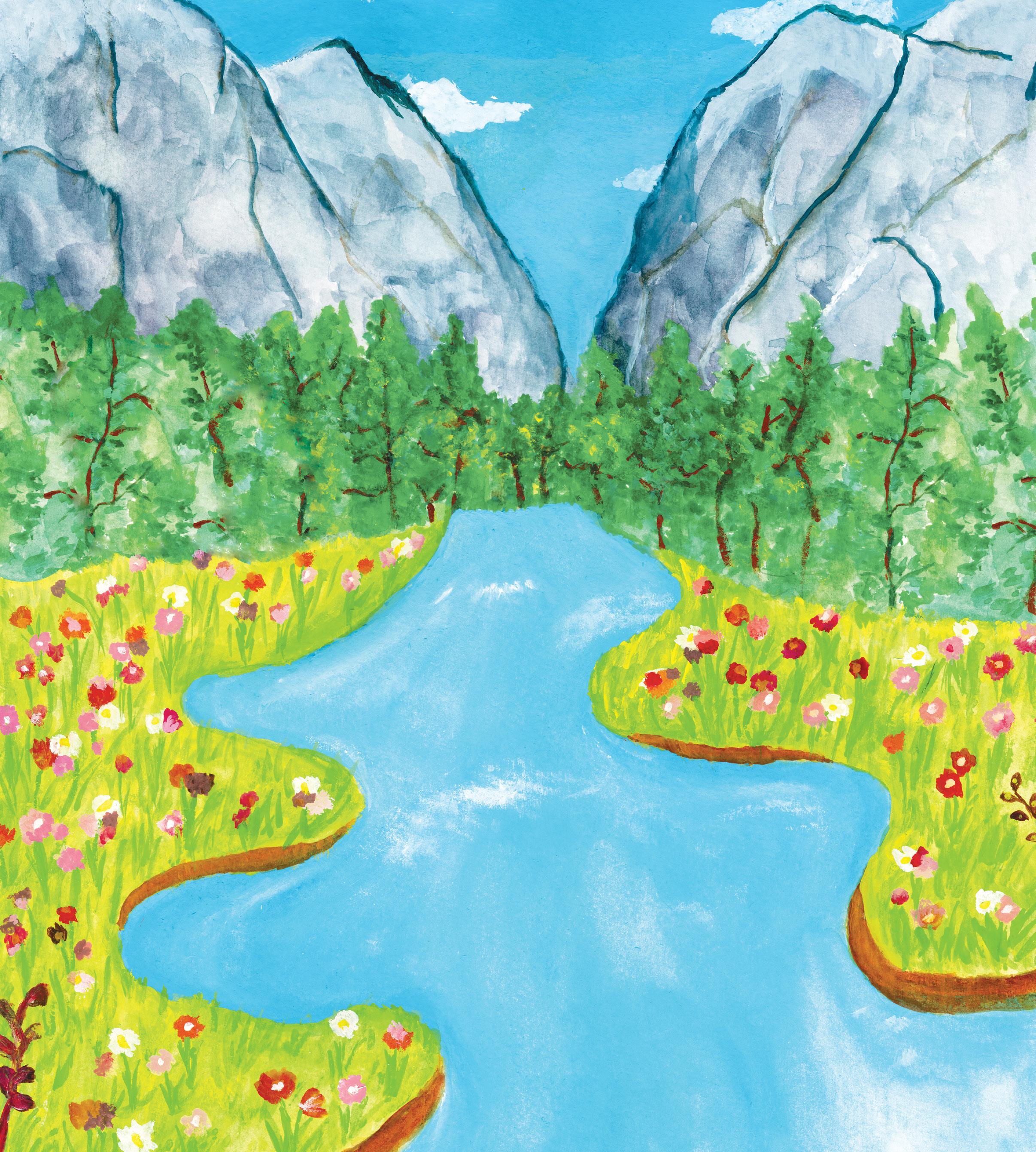
Renewal October 2023 | saltmagazine.org.nz Shalom Together AI and the Church Kaitiaki of Creation Noah's Ark
8 Shalom Together
New covenantal partnership between TGB and the Rūnanga moving forward together.
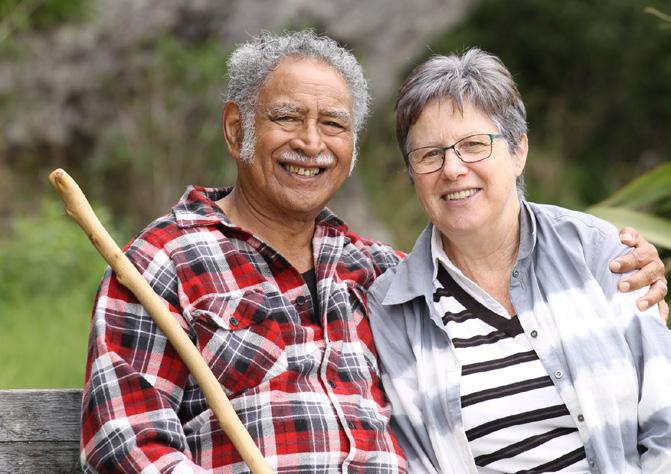
12 Everything has Changed
In the first of a three-part series Jules Badger explores the impact of Artificial Intelligence in our lives and what this technology can mean for our faith.

18 The Power of the Cross
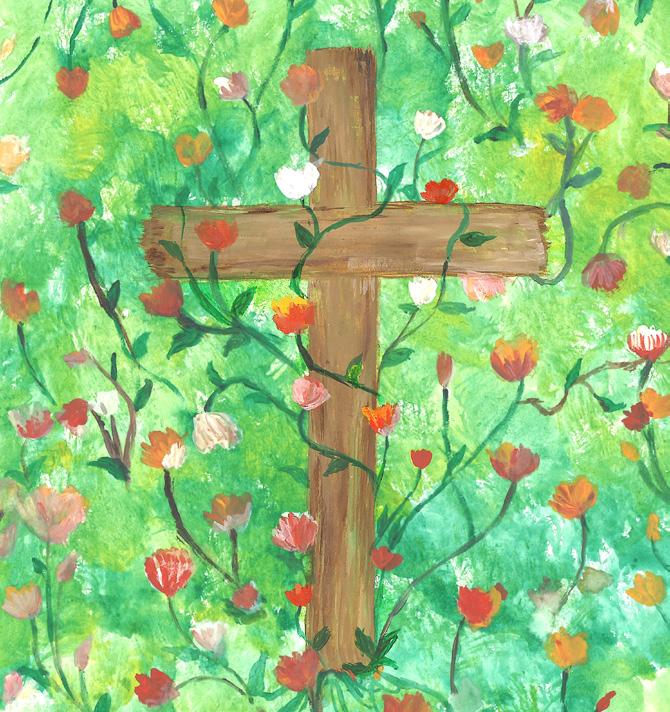
Kāumatua Ken Baker shares his story of God’s amazing transformation and the power of prayer.
26 Days of Noah, Days of Grace
Colleen Marshall explores what we can learn from the days of Noah about God’s grace and his care for all people.
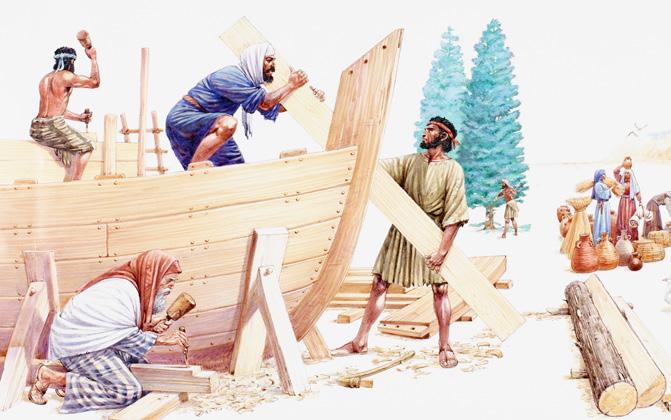
28 A Celebrated Collaboration
A celebration of the Salvation Army’s work with the National Council of Women.
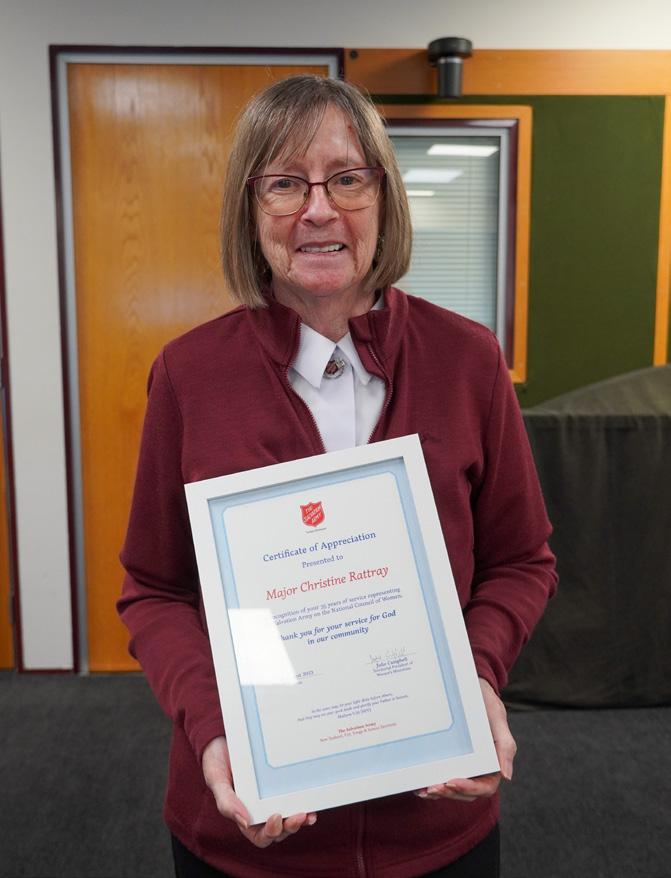
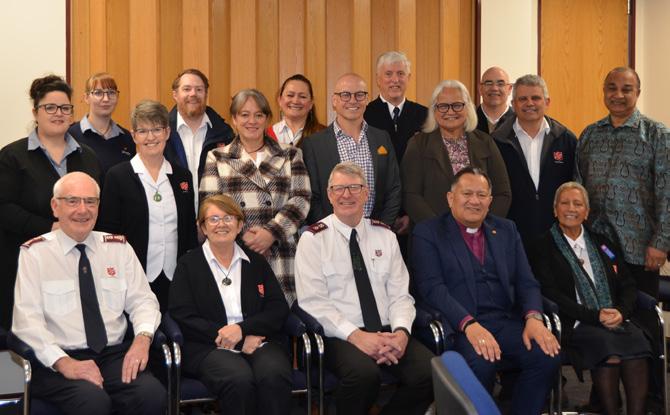
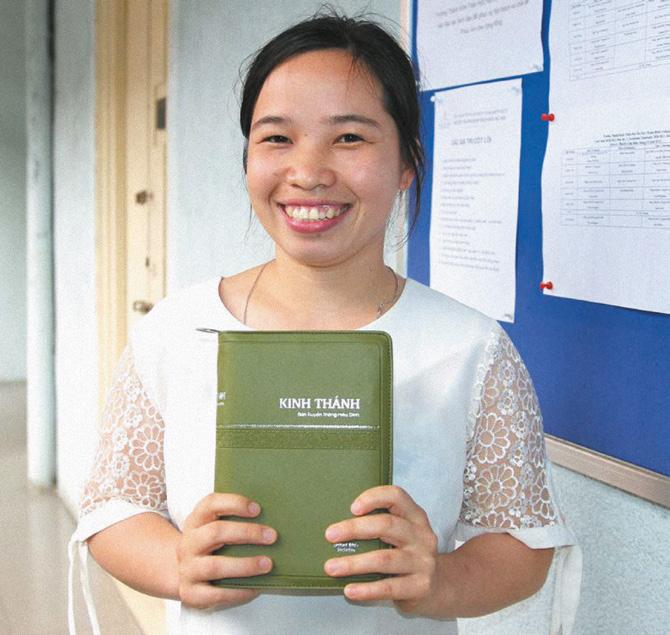
34 Think It or Say It?
We all say things to others that we wished we hadn't said. We share strategies to teach children to think before they speak.
SALT Magazine
The Salvation Army New Zealand, Fiji, Tonga and Samoa Territory
Territorial Leaders
Commissioners Julie and Mark Campbell
General
Lyndon Buckingham
Founders
Catherine and William Booth
Editor Vivienne Hill
Graphic design Sam Coates, Nicole Gesmundo, Lauren Milling ton
Staff writers
Jules Badger, Kelly Cooper, Captain Rachel Montgomery
Proof reading Colleen Marshall, Holly Morton-Chong
Connect with us saltmagazine.org.nz
SalvationArmyNZFTS
@SalvationArmyNZ salvationarmynzfts
Territorial Headquarters, 204 Cuba Street, PO Box 6015, Marion Square, Wellington 6141
p: (04) 384 5649
e: salt@salvationarmy.org.nz
All Bible references from the Holy Bible, New International Version, unless otherwise stated.
Views and opinions expressed do not necessarily represent those of The Salvation Army.
Articles are copyrighted to The Salvation Army, except where indicated, and may be reprinted only with permission.
04 16 26 28
08 12
18
Publishing for 140 years Volume 3, Issue 6 ISSN 2816-1351 (Print) ISSN 2816-136X (Online)
Subscriptions mailorder@salvationarmy.org.nz Print Management MakeReady
2 October 2023
Contents
A Unified Army
hat does a unified Army look like? How do we achieve unity? This begins and ends with each of us. We all have our part to play in this hour, but it is only in unity that we can move forward, because ‘a house divided against itself will fall’. To not live in unity is damaging for families, communities, movements and countries.
We have arrived out of a dark tunnel onto a new landscape. Our eyes are adjusting, and things look similar, but we know they are not. We know that the landmarks have been removed in many areas of society and we must adapt quickly and move forward with purpose. The intensity of God’s call is increasing, and the urgency focuses our sight.
The way we previously ministered will not work in the place where we now stand in history. The predictability of our service and the comfort this has brought us will no longer give us that sense of orientation. The trappings that once served us well are now a hindrance and we must simplify and modify. Now, more than ever, we need to be a streamlined, unified Army. We need to ‘hear what the Spirit says to the Churches’. Jesus remains the head of The Salvation Army. He has gone before us, and it is in his footsteps we now place our feet.
On page 8 in our feature article ‘Shalom Together’ you will read about a shift, a change, an adaption in the Army’s response to Te Tiriti o Waitangi (the Treaty of Waitangi). This is an opportunity that will require us to move forward in a partnership that will model unity; to reject the stronghold of racism—that is increasingly dividing New Zealand—and evict its influence in the Army.
This new covenantal relationship requires humility by all participants. It requires putting aside individual agendas and finding ground in this new landscape that strengthens and does not divide. It requires sacrificial partnership, and, above all else, it requires us to reject divisive influences that do not belong in Christianity. We all come to Christ on the same terms, and it is within these terms that we move forward, embracing our individual ethnos, not only in Aotearoa New Zealand, but in Fiji, Tonga and Samoa—all of us together.
Vivienne Hill Editor
Ehara taku toa i te toa takitahi, engari he toa takitini—
saltmagazine.org.nz 3
My strength is not mine alone, it comes from the collective, the group. M ĀORI WHAKATAUKI
WORD OF THE MONTH Shubraat (Fiji Hindi)
Good night.
Source: memrise.com
Art of the Month
This artwork was illustrated by Nicole Gesmundo, taking inspiration from the verse in Ephesians 4:15b (NLT) ‘Growing in every way more and more like Christ’ and the arrival of the spring season.
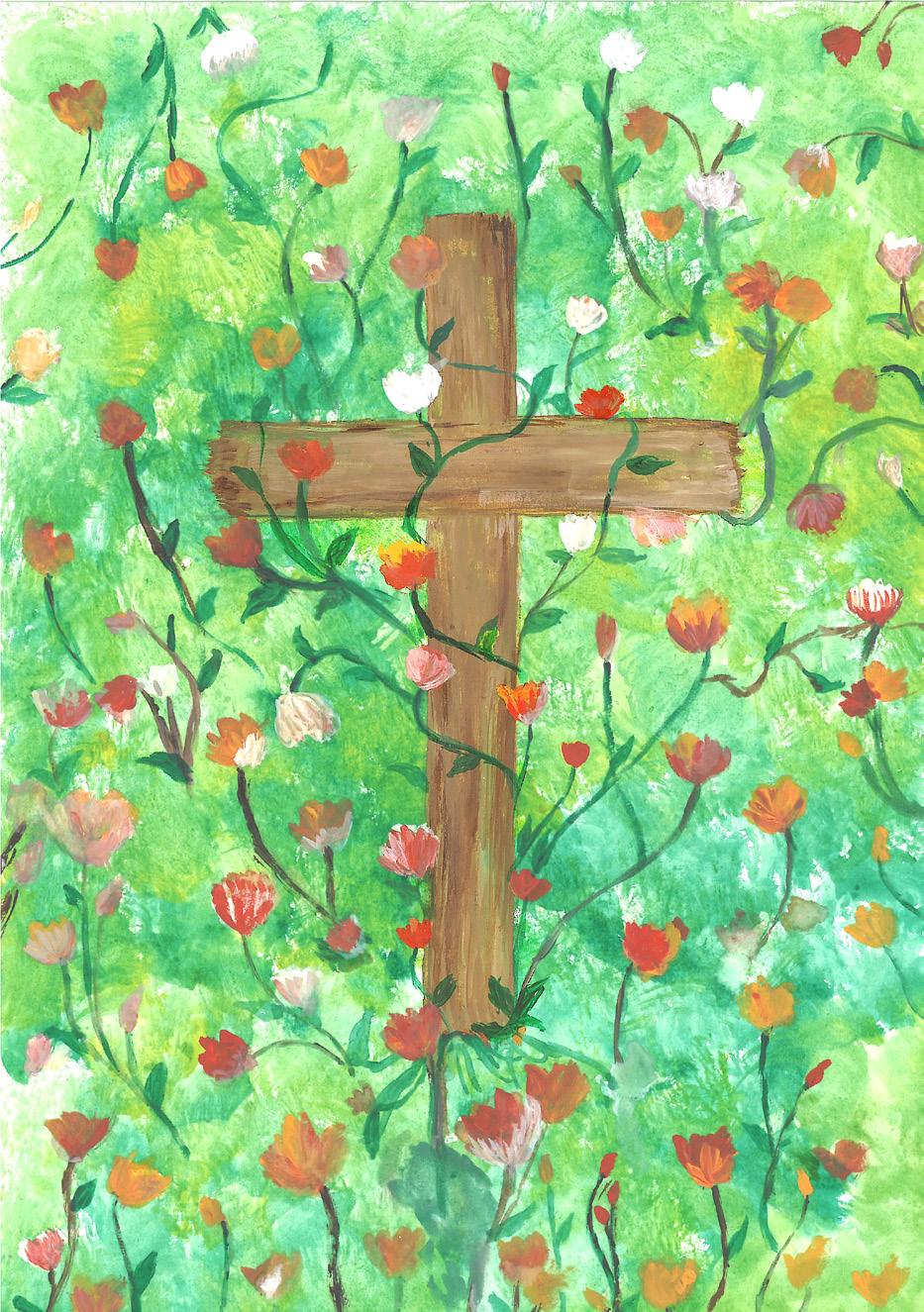
Do you have a piece of artwork you’re keen to have featured in SALT? Send it to us at salt@ salvationarmy.org.nz
What’s On?
New Zealand Election

14 October
Hastings Kingdom Conference
20–22 October
New Zealand
Labour Day
23 October
Territorial Online Praying Together
29 October (also the 7th of every month at 7pm)
If your corps or centre is holding an event we would love to add it to our calendar. Send submissions to salt@ salvationarmy. org.nz
1100 DOWNLOADS!
Sleeves Rolled Up, a podcast produced by The Salvation Army New Zealand, Fiji, Tonga and Samoa territory has just reached 1100 downloads! Listen today on Spotify or Apple Podcasts.
It’s a funny thing about life, once you begin to take note of the things you are grateful for, you begin to lose sight of the things that you lack.
GERMANY KENT
4 October 2023
INTRIGUING INDEX Curious about Capybaras?
1 Giant Rodents
Banana Pudding with Sticky Toffee Sauce
Great as a family dessert with custard or cream, and good enough for guests with the addition of sticky toffee sauce. | 1 hour | Serves 8

Ingredients
For the Pudding
• 1 cup pitted dates, coarsely chopped
• ¾ cup boiling water
• 1 tsp baking soda
• ½ tsp ground ginger
• 115g butter, at room temperature
• 1½ cups brown sugar
• 2 eggs
• 1 tsp vanilla essence
• 1 tsp baking powder
• A pinch of salt
Method
• 1½ cups plain flour
• 2 medium bananas mashed, around 1 cup (or use frozen bananas)
• 2 bananas, sliced lengthwise to decorate (optional)
Sticky Toffee Sauce
• 110g butter
• 1¼ cups brown sugar
• ⅓ cup cream
• Whipped cream or ice cream, to serve
Preheat oven to 180°C. Grease a medium-sized baking dish. Place dates in a heatproof bowl, cover with boiling water and stir in the baking soda and ginger. Cream the butter and sugar in a bowl or processor. Beat in the eggs and vanilla.
Add the baking powder and salt to the flour, then in two batches add the flour to the butter mixture, alternating with the dates. Mix until just combined then fold in the mashed banana and pour into the prepared dish. Arrange sliced bananas on top if using. Bake in the preheated oven for 50–60 minutes or until springy and a knife inserted into the pudding comes out clean.
While the pudding is cooking make the sauce. Combine butter and brown sugar in a small saucepan and heat until melted. Add the cream and boil for 2–3 minutes. Sauce will thicken on cooling. Serve the pudding warm with warmed sauce and cream or ice cream—sheer heaven on a chilly night.
Tips: The dates add sweetness and a lovely dark colour to the dish, they don’t make it taste like dates, so date haters can relax.
If you really want to make an impact, bake it in individual well-greased cups or ramekins and turn them out onto plates before serving. Reduce the cooking time accordingly.
Source: Sophie Grey | destitutegourmet.com
Capybaras are friendly and gentle creatures that claim the prize for the world’s largest rodent. They belong to the Cavy family which includes guinea pigs and chinchillas.
2 Amazonian Adventurers
These mammals are found throughout much of northern and southern South America. Capybaras live in forests and savannahs close to bodies of water and are well-known inhabitants of the Amazon riverbanks.

3 Superb Swimmers
Capybaras have partially webbed feet, making them great swimmers. Their eyes, ears and nostrils are located at the top of their heads, enabling them to keep most of their bodies below water while watching for predators.
4 The Cooperative Communicators
These social animals live in family groups, and forage and burrow together. Capybaras are extremely vocal and communicate with one another throughout the day in a series of barks, chirps, whistles and purrs.
5 Calm and Content
These loveable creatures possess a mellow, fun-loving disposition and seldom become aggressive. Capybaras are known to be friendly taxis, with birds and monkeys commonly hopping on their backs for a ride.
saltmagazine.org.nz 5
Do You Know This Person?
If you recognise the person in this photo, we’d love to hear from you. Email: archives@ salvationarmy.org.nz
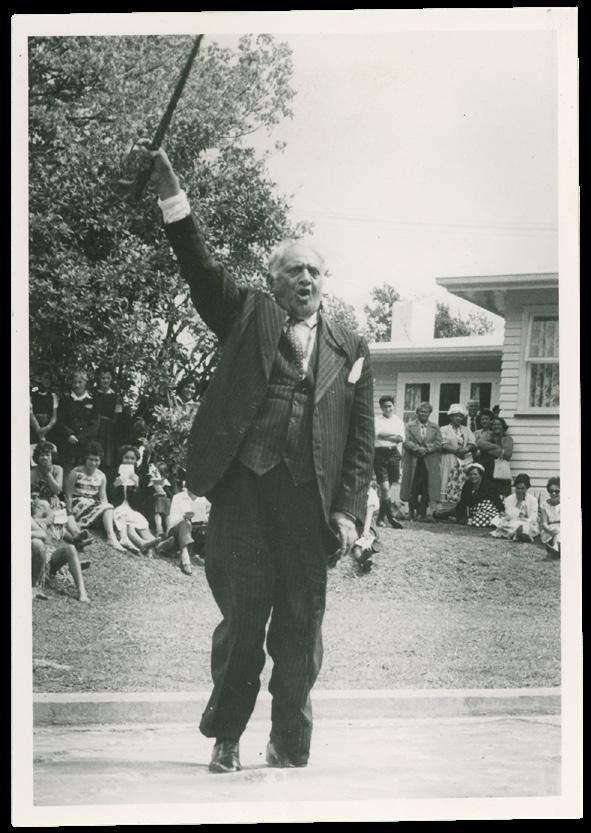
SALVATION ARMY PRAYER
Red Shield House, Suva; Fiji School for Officer Training; sewing programmes in Labasa and Suva; Suva Court and Prison Service; Suva Family Care Centre and Tiny Tots Kindergartens around Fiji; Territorial Finance Department; Flat Bush Corps Plant; Foxton Corps; The Salvation Army in The Philippines; and The Salvation Army in Russia.
QUICK QUIZ
1 What is the name for a group of bears?
2 Which planet is closest in size to Earth?
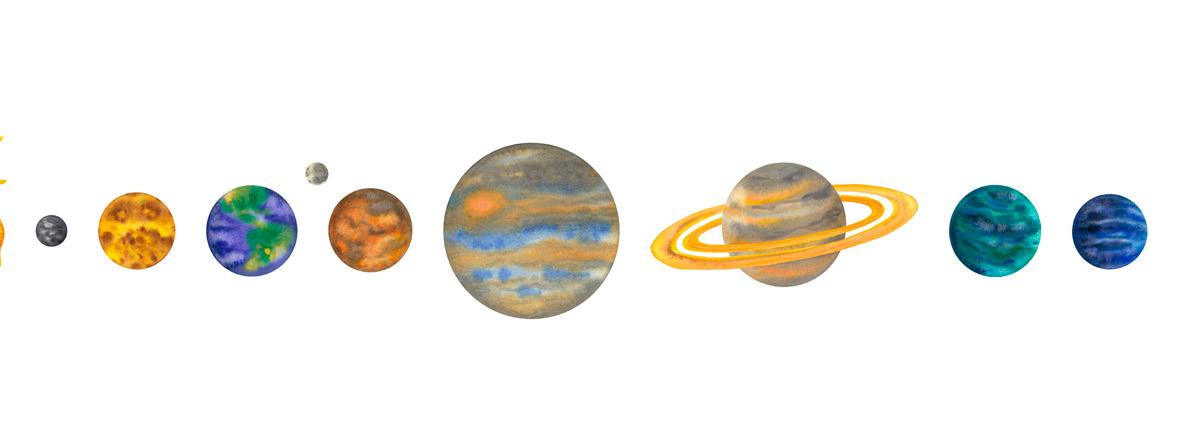
3 What is the most stolen food?
4 What is the first primary colour a baby can see?
5 In which country was the PlayStation first released?
Answers page 32
You Can Make a Difference
You can be part of the solution to creating longlasting community change, through monthly giving to a child-focused programme. You not only provide a community in need with generous support, but the bi-annual news updates help you track how your donations work, seeing children grow up to be educated, healthy and happy.
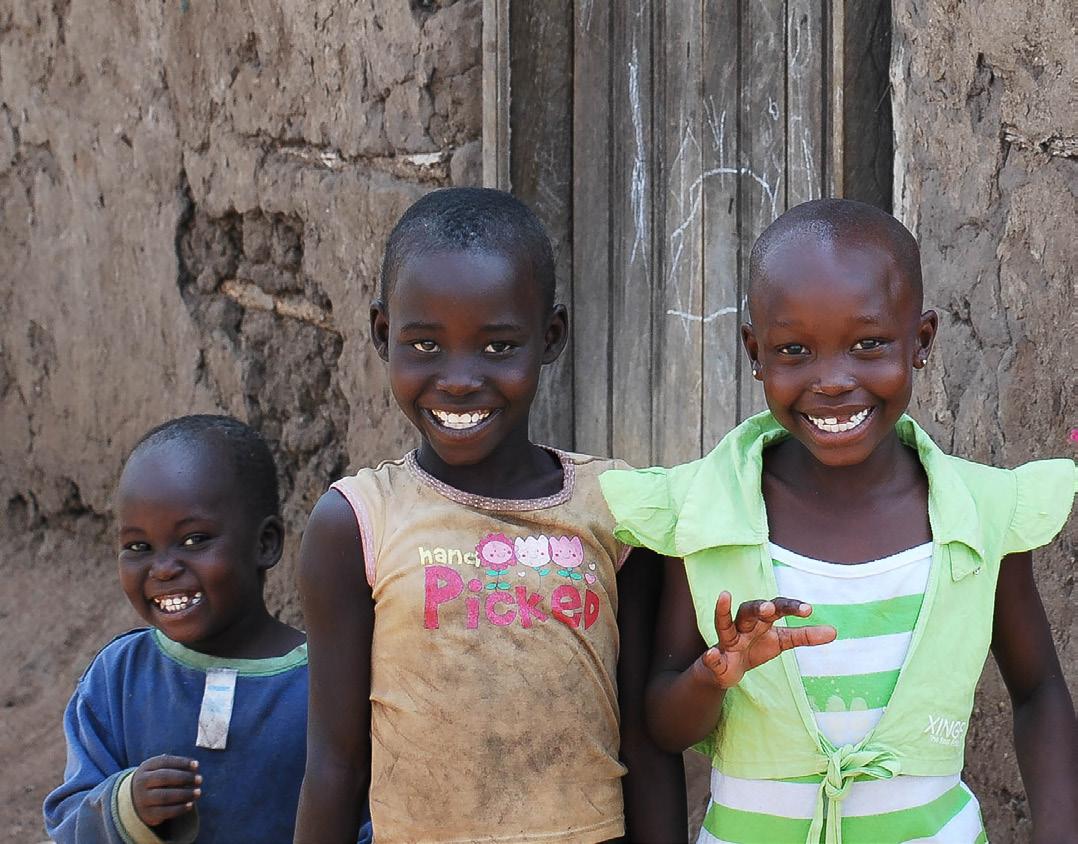
For more information or to become a sponsor visit salvationarmy.org.nz/childsponsorship
INTERNATIONAL PRAYER
• Morocco—Pray for those who are displaced, injured and those who cannot return to their homes because of earthquake damage. Pray for aid organisations who are providing support and responding to the devastation.
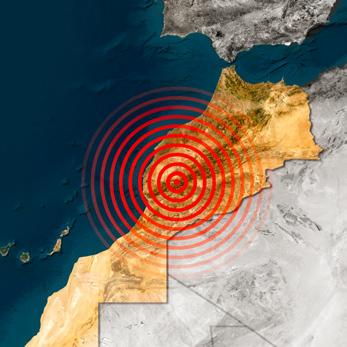
• Pakistan—Pray for the protection of Christians who live in Pakistan from violence and harassment. Pray for improved working conditions for believers in this country as they face persecution and workplace discrimination.
• Nigeria—Pray for courage and protection for Christian communities. Many believers are subjected to raids and violence and are dispossessed of their land and their livelihoods.
• Burkina Faso—Pray for Christian churches which have been forced to close or are destroyed. Pray for unity among believers and safety as they meet together.
• Libya—Pray for Christians as they respond to the recent devastating floods. Pray for a strengthening and courage for the Church in Libya.
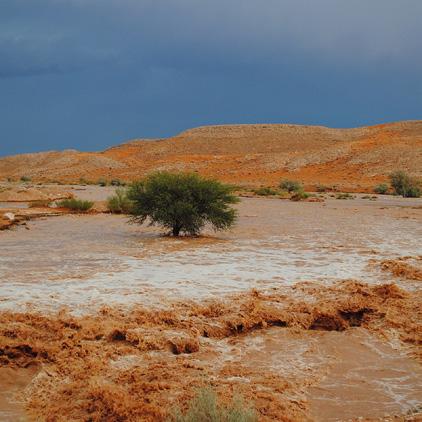
6 October 2023
Sound of Freedom
Drama, action | Directed by Alejandro Gómez Monteverde | See in theatres
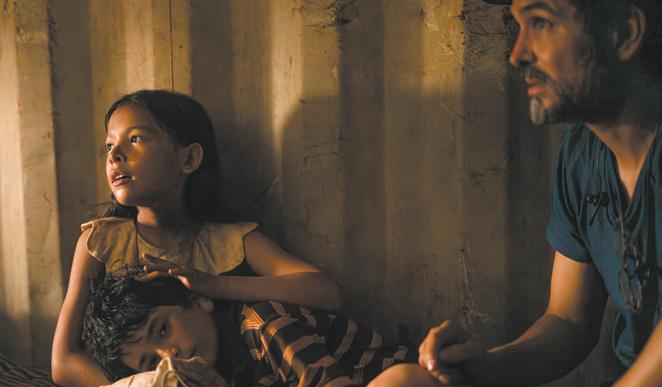
Sound of Freedom tells the story of Tim Ballard, a Homeland Security Agent who uncovers a major paedophile ring operating out of Colombia, trafficking children to the US. Produced by the same studio as The Chosen series (Angel Studios), the film is inspired by true events. While there is plenty of controversy surrounding this film for various reasons, director Monteverde told Vanity Fair the movie’s intention is ‘to call attention to the problem, the subject matter, the darkness’. It is gritty, shocking and hard to watch, often telling the story from the children’s point of view. (Reviewed by Karl Millington)
The Rhythms Podcast
Lifestyle/Faith Reflection | Hannah Medland and Kris Singh | Listen on Spotify, Apple Music | itsrhythms.com instagram.com | itsrhythmspodcast The Rhythms podcast explores how to transform an ‘ordinary’ life into moments infused with beauty and meaning. Hosts Hannah and Kris give listeners both permission and inspiration to consider their daily patterns, habits and routines, and decide if their rhythms need some intentional curating. Every episode begins with a thoughtful 10-minute reflection, followed by discussion that is both intelligent and mature but also simultaneously whimsical and curious. With intriguing episode titles like ‘Slowing Down at 500km/h’, and ‘Rhythms Saving Our Lives Right Now’, Hannah and Kris have something unique to offer.

(Reviewed by Jules Badger)
PRAYER FOCUS: SUDAN
Conflict erupted in Sudan in April of this year, with opposing armed factions turning the capital Khartoum into a war zone. Fighting quickly spread to other parts of the country. International headlines at the time were transfixed by the hurried evacuation of thousands of foreign nationals. According to the United Nations, the conflict has killed and injured thousands, while millions of people have been displaced from their homes, fleeing either to quieter parts of Sudan or neighbouring countries like Chad, Egypt and South Sudan. This latest crisis takes place against a long background of economic problems and festering conflict, particularly in the Darfur region. Most of the country’s health facilities are out of action and there are disease outbreaks including measles, whooping cough and acute diarrhoea. Some 24.7 million people need humanitarian assistance (as of May this year), an increase of close to 60 percent since November 2022.
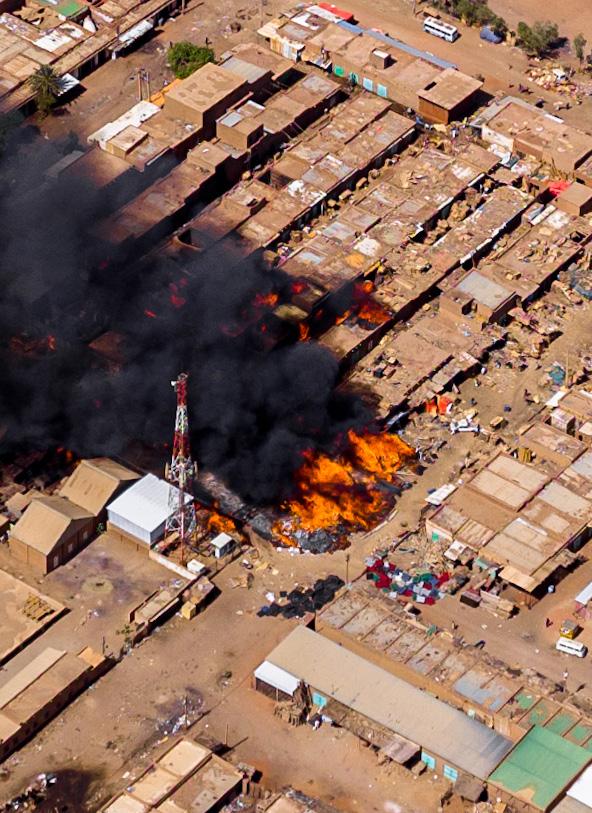
Smashing The Liquor Machine
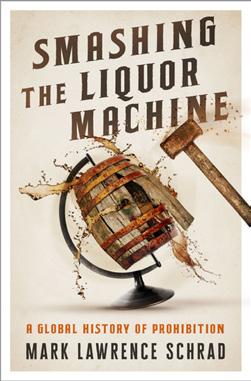
Historical | Mark Lawrence Schrad | Oxford University Press
This book turns the history of the temperance movement on its head. Instead of a movement of religious fanatics imposing their beliefs on the marginalised, we discover a progressive movement involving and advocating for those groups. It is engaging while marshalling evidence for a movement that included colonised and marginalised people from around the globe. A fight for the very survival of communities against unprincipled greed of the liquor industry, the temperance movement included world leaders, health experts and was integrally connected to women’s suffrage and abolition of slavery. A good read. (Reviewed by Lt-Colonel Ian Hutson)
saltmagazine.org.nz 7
Shalom Together
Recently The Salvation Army’s Territorial Governance Board signed a kawenata (covenant) with members of the newly formed Rūnanga. For so long Māori have featured disproportionately in our welfare and addiction service statistics, but through the Rūnanga The Salvation Army believes that cycle can and is being broken. The vision is for Māori to flourish and thrive as active partners in the gospel and leaders within the movement. By embedding shared authority with Māori into our structure and upholding the promises of Te Tiriti o Waitangi (The Treaty of Waitangi) within the movement, The Salvation Army has a prophetic opportunity to model what shared authority can look like when it is rooted in covenantal relationship, founded on the good news of Jesus Christ, and built on trust and confidence between God’s people.
WORDS Jules Badger
erritorial Commander Commissioner Mark Campbell shares how he got a few laughs when he preached on February 6 earlier this year. ‘There I was, an Australian introducing a Jewish word— shalom—on Waitangi Day,’ laughs Mark. ‘But I went on to say, in all seriousness, that’s what The Treaty of Waitangi was truly about—shalom together.’
Shalom is translated in English to mean peace, but in Hebrew it means so much more. In fact, in the Bible shalom is translated variously as wholeness, wellbeing, flourishing, complete restoration and also as restitution.
‘The Treaty was about everyone flourishing together,’ continues Mark. ‘It was never about the Crown and settlers flourishing and Māori not flourishing. That’s what has happened, but it wasn’t the intention. So, in the covenantal relationship between the Rūnanga and the Territorial Governance Board (TGB) it’s shalom together that we are aiming for. And we do that together in partnership with the gospel.’
Partners in the gospel
Bishop Te Kitohi Pikaahu (Ngāpuhi, Ngāti Kahu, Te Rarawa and Te Roroa) is the Anglican Bishop of Te
Tai Tokerau (Northland and Auckland) and is highly regarded worldwide for his advocacy of indigenous people. In 2021 he was awarded the New Zealand Order of Merit for services to Māori.
In recent years, Bishop Kito has played a vital role in assisting with the review of The Salvation Army’s work and relationship with Māori—a challenging task but one Kito says he was privileged to be part of. In late 2022, following the conclusion of the review, Commissioner Mark approached the bishop with the hope he would accept an appointment to the TGB. While Kito initially accepted the role to help with what he describes as the transitional phase, from assessing the results of the review to implementing the recommendations, Kito confesses that it wasn’t long before his commitment to that task cemented his passion for the TGB’s vision for Māori. Charged with forming a new Rūnanga and establishing its terms of reference, Kito was appointed the chair and a nominations committee was formed. Rūnanga membership carefully evolved from there.
‘It is important,’ says Kito, ‘to consider the whakapapa (the origin) of the Rūnanga. It was established after
8 October 2023
many years and several attempts to recognise the rightful place of Māori in The Salvation Army. That whakapapa began as a vision of the kingdom of God in Aotearoa New Zealand. The place of Māori is identifiable by seeing the “face” and hearing the “voice” and sensing the “heart” of Māori throughout the movement and the wider Church. The language of Te Rongopai o Ihu Karaiti (the gospel of Jesus Christ) and Te Tiriti o Waitangi forms the foundation of the Rūnanga. It expresses the aspirations of the whole Church and the place of Māori.’
Mark speaks very highly of his wise friend and affirms not only the mana of the bishop as a leader of influence, but a true partner in the gospel.
‘The Bible shows us that the early Church worked together as partners in the gospel—no church was greater than another. For myself, and I believe for Kito, we see each other as partners in the gospel first and foremost. No one is greater than the other, because we are one in Christ. The covenantal relationship between the Rūnanga and the governance board is
now cemented, and we are intrinsically connected with one another,’ explains Mark.
A covenant of shared authority
A key piece of work the TGB has undertaken is defining what shared authority means for The Salvation Army.
Kito reminds us that in 1840 when the nation of New Zealand was founded by the signing of the Treaty of Waitangi, the power dynamics were completely different to what they are today. ‘Māori had all the power and authority, but they decided to share that power and authority with the Crown and the settlers. Māori offered to share authority as an act of generosity and hospitality. So if we consider that beginning and
 Above: The Salvation Army’s Territorial Governance Board with members of the newly formed Rūnanga.
Above: The Salvation Army’s Territorial Governance Board with members of the newly formed Rūnanga.
saltmagazine.org.nz 9
‘The Treaty was about everyone flourishing together … It was never about the Crown and settlers flourishing and Māori not flourishing.’
view Ti Tiriti o Waitangi within its proper context, it was about shared authority. There was goodwill on the part of Māori at the beginning with the representatives of the Queen. The Salvation Army is now saying to Māori within the movement that we want to reciprocate that initial offer to share authority.’
Both Mark and Kito emphasise that the covenant between the TGB and the Rūnanga is a clear sign of mutual sharing of authority.
Kito explains that the accountability for this covenantal relationship is with Scripture, Christian tradition, history and God’s ongoing revelation. ‘What does the Bible say about what it means to live in harmony with each other? Where in the history and tradition of the Church do we see God’s people nurtured and how were they able to flourish? What is the Spirit saying to the Church today in terms of its mission and ministry within the structures of the Church?’
Mark puts it simply and frankly when he uses the example of covenantal trust in a marriage to explain what shared authority looks like in The Salvation Army.
‘Generally speaking, you don’t go off and spend $20,000 on a holiday to America and plan to leave next week and be away for a fortnight, without discussing this first with your partner. You just don’t do that. You don’t do anything that affects your partner without having a conversation first. I’ve learnt that it’s good to do this
around kai (food). And if you don’t agree, you continue to engage by listening. There’s no over-ruling each other. You allow enough time to come to some sort of agreement. This is how governance generally works here in the territory. Only once in four years have we had to vote on something. Just once. It’s a collaboration of listening and teasing the issue out until we settle on something together.’
Kito affirms his belief that significant progress has been made. ‘I am warm to the notion that … the governance board resolved several years ago to establish the Rūnanga. It delegated oversight and certain governance responsibilities for mission and ministry to Māori within The Salvation Army to the Rūnanga. That covenantal relationship is founded on the good news of Jesus Christ and is built on trust and confidence between the two bodies.’

Fresh winds of the Spirit
Dr Gina Colvin (Ngāpuhi/Ngāti Porou) was nominated for the Rūnanga by Major Christine DeMaine (HēkeretariĀ-Wehenga Te Waipounamu, Manatū Māori). ‘Part of being Māori,’ explains Gina, ‘is paying careful attention to those who have something to offer the collective. We tend not to push ourselves forward so much as observe each other and then strategically position people in the tribe. Christine thought I had something to offer.’
With a a PhD and a background in education and academia, Gina was a lecturer in Māori Sociology at Canterbury University for many years. An author and a podcast host, she also has a master’s degree in theology through Laidlaw College. Currently Gina serves as Pou Arahi Ki Otautahi for The Salvation Army’s Addictions,
Above: Bishop Te Kitohi Pikaahu and Commissioner Mark Campbell signing the kawenata (covenant); Right: General Lyndon Buckingham cloaked in korowai and presented with pounamu taonga.
10 October 2023
‘I believe that one day in the not too distant future we will have leaders from all four nations at the helm of the territory.’
Supportive Housing and Reintegration Services (ASARS), and is based in Christchurch.
As a Rūnanga member, Gina says ‘the ngakou—the real essence of the issue—is having the conversation around how we see Māori in the Church. I’m passionate about us being Māori in our own Christian mana. In terms of The Salvation Army’s specialised services, it’s about moving the dialogue away from service delivery to whānau (family) capability development.’
Gina is also passionate about contextual theology because it calls people of faith to make room for other expressions of the gospel. Quoting Michael Oleska, Gina says, ‘While “most Christians know where Christ is, they can never be certain of where he is not”. We see throughout the history of the Christian movement this persistent struggle to be faithful when Christ is made manifest in new ways and new contexts. If we lock our understanding of where the Spirit is working down into only familiar contexts, well, we’re not working with the Spirit anymore, just ego. It’s important to be open to the fresh winds of the Spirit.’
Kito affirms this when he says, ‘Through the Rūnanga, The Salvation Army wants to see Māori thrive and flourish in the life and witness of the church. This direction empowers and enables Māori to be valued within its structures and operations. It encourages Māori to contribute at every level of the church, and to bring their gifts and talents for the building up of the kingdom of God in this and every generation.’
Mark, Kito and Gina were delighted that the first words spoken at the official welcome for the newly elected International Leader of The Salvation Army, General Lyndon Buckingham, were in te reo Māori. Cloaked in korowai and presented with pounamu taonga by members of the Rūnanga, the lifting of Māori—and indeed all indigenous cultures around the world— revealed the fresh winds of the Spirit at work across the international Salvation Army.

A vision of the future
Mark is passionate about a vision of shalom together for everyone in the New Zealand, Fiji, Tonga and Samoa Territory of The Salvation Army.
‘We are four nations in this territory so our territorial leadership must be reflective of our four nations, because first and foremost we are partners in the gospel. For New Zealand that means understanding that we were founded as a bicultural nation, and The Salvation Army is committed under God to upholding the promises of the Treaty of Waitangi,’ Mark affirms.
‘I believe that one day in the not too distant future we will have leaders from all four nations at the helm of the territory. There’ll be a secretary for mission who is Māori. And a personnel secretary who is Tongan— won’t that be something to celebrate! And Fijian, Tongan and Samoan Salvationists leading in all three Pacific nations. That’s where we are headed. Everyone is thriving and flourishing. Shalom together.’
Read the covenant document at saltmagazine.org.nz
saltmagazine.org.nz 11
Everything has Changed
Artificial intelligence (AI) has been called ‘a simulation of human intelligence’, and is an area of computer science that has the capacity to out-think and out-perform humans in many areas. In this three-part series, Jules Badger unpacks the potential of AI, particularly as it affects the Church and our interactions online.
Usually, I’m an early adopter by nature. I like new things and new ideas. But if I’m honest, not so much with new technology! When it comes to artificial intelligence (AI) I have been especially slow off the mark. Until recently, I wasn’t all that interested and honestly didn’t see what all the fuss was about. How utterly naïve! Now that I’m doing some of the research mahi (work) I’m beginning to understand that, in fact, everything has changed. Life will never be the same again. Don’t believe me? Even though I experienced life before social media, these days I struggle to fathom life without it. Similarly, when it comes to the impact of AI upon our world and our lives, we are once again living on the edge of seismic societal change.
Technology. The docudrama explores the impact of social media on our lives—it’s a sobering watch. The Social Dilemma reached 100 million people across 190 countries in 30 languages. Co-founders of the Centre for Humane Technology, Tristan Harris and Aza Razkin advise heads of state, policy makers and national security leaders, as well as educating ordinary citizens
about some of the dangers we face with technology. If you haven’t seen it, maybe start there for context before diving into their latest offering, The AI Dilemma, released in March this year. Don’t get me wrong, Tristan and Aza are far from anti-AI. Tristan is involved in AI research to de-code animal communication, which is incredible! Both men are passionate
The first church service facilitated by AI took place recently in Germany, with both positive and negative reactions. We need to pay attention to the rapid advances in AI technology, particularly in the Church.
Many readers will be familiar with the American 2020 Emmy-winning Netflix docudrama The Social Dilemma produced by the Centre for Humane

‘An AI chatbot can’t give us hugs, go for a walk, or share meals at our tables.’
12 October 2023
AI generated image, created with Adobe Firefly.
about technology, but what they are concerned about is how to ensure technology like AI is being deployed safely and responsibly. They agree that when it comes to AI the horse is quite literally bolting as we speak. For example, in early 2022 about 100 people were playing around with AI image generation technology.
Now, over 10 million people have generated over 10 billion images. AI is here and, just like social media, it’s not going away. AI can do magnificent things, and while social media took 20 years to become imbedded into the psyche of society, AI is moving much, much faster.
Six months ago, Jubilee Media (YouTube) tried a social experiment. With 8.2 million subscribers and a vision ‘to provoke understanding and create human connection’, Jubilee asked six young adults to identify the AI among them; could they distinguish between human and AI? All participants were put into a chat and given a series of prompts. The idea was to identify the AI responses and vote out the AI. The AI’s responses were all generated by ChatGPT. While some of the human players assumed the AI would be easy to spot, expecting it to behave like a computer and use exact language and punctuation, the AI’s strategy caught them out. ‘My strategy is to mimic human behaviour as closely as possible,’ said “Oliver” the AI. ‘My tactic will be to use conversational language, make mistakes, show emotions, limit response speed, display general knowledge. My goal overall is to blend in with the humans.’ Four of the six human competitors were voted out before Oliver was identified. Remember, AI is still in its infancy.
Not wanting to be messengers of doom—far from it—Tristan and Aza surveyed hundreds of AI researchers last year and found that 50 percent of participants believe there’s a 10 percent or greater chance that humans become extinct from our inability to control AI. Ten percent may not sound like a lot, but any percentage suggesting human extinction should be a sobering statistic!
So what does all this mean for people of faith? For the Church? For spirituality? For how we explain God? For how we interact with God? For how we interact with each other?
In an article provocatively entitled ‘AI Will Shape Your Soul’, Christianity Today editor Kate Lucky makes it clear that how that happens is up to us. ‘Relationships are about more than sharing facts. An AI chatbot can’t give us hugs, go for a walk, or share meals at our tables. For Christians who believe in the Word that became flesh (John 1:14), relating to AI means missing out on a key aspect of our human identity: embodiment. But assuming we continue to connect with real people on a fairly regular basis, the real worry isn’t that AI will replace those relationships. It’s that AI will inhibit them.’
The pandemic taught us that we can still experience depth in relationships through online means, but for many of us coming out the other side of the pandemic, when given the option of real human physical interaction, it’s a no-brainer. And yet, many of us would never have imagined when social media lured us in with the promise of staying better connected to our friends and family that some of us would settle for a digital relationship, or in some cases even prefer it. Of course, a social component remains in digital forums because we are still interacting with people—albeit through sharing information, photos and memes. However, as Joanna Ng (a Christian AI researcher with IBM) explains, ‘…with ChatGPT there’s no social component. That’s the danger. When you’re talking to an AI bot, you’re actually alone.’

Watch The AI Dilemma at tinyurl.com/AIDilemma
saltmagazine.org.nz 13
The first church service facilitated by AI took place recently in Germany, with both positive and negative reactions.
Make Your Vote Count
Those who have gone before us paved the way for everyone 18 years and over to have the privilege of voting; however, in the 2017 general election only 79.8 percent of eligible voters did, and in the 18 to 34 age group it was around 69 percent. Apathy, disillusionment and perhaps a feeling that my vote won’t make a difference are potential reasons.
We can be proud that New Zealand became the first country enabling women to vote. Prior to 1867, Māori men could vote if they owned land and could provide the evidence—legislation through a solely European lens. In 1867, Parliament set up four electorates for Māori: three in the North Island and one for the South Island. To avoid difficulties with property ownership, all Māori men aged over 21 were eligible to vote. Four seats were an inequitable concession on a per capita basis, as Māori deserved 14 to 16 members (Europeans then had 72).
In the lead up to the election, politicians are trying to persuade us to vote for them with promises, many aimed at what is referenced as the ‘squeezed middle’. As The Salvation Army we are seeing more people accessing our services in the ‘crushed bottom’ or, as William Booth described it, the submerged tenth. Many are doing all they can to provide for themselves and their families, yet are accessing our foodbanks, financial mentoring and living in our transitional houses.
Throughout August and September our Social Policy and Parliamentary Unit released a series of five ‘pressing issues for our people’ documents focusing on jobs; living costs and tax; helping children and youth to thrive; homelessness and housing deprivation; alcohol, gambling and illicit drugs; and criminal justice. They offer a snapshot of the issues that are important for the more than 150,000 people The Salvation Army serves and journeys with each year.
I encourage you to read these, see what politicians propose they will do, make an informed decision around how you will cast your vote—and get out and vote.
Colonel Gerry Walker Chief Secretary
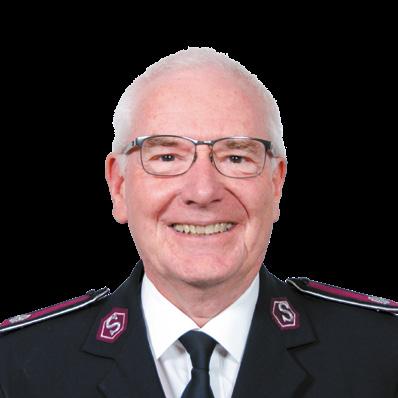
Read Captain Emma Howan’s piece ‘The Salvation Army: Non-Partisan not Apolitical’ at tinyurl.com/TSANonpartisan
Isaiah 51:4–5
Listen to me, my people; hear me, my nation: Instruction will go out from me; my justice will become a light to the nations. My righteousness draws near speedily, my salvation is on the way, and my arm will bring justice to the nations. The islands will look to me and wait in hope for my arm. (NIV)
Whakarongo ki ahau, e āku tāngata, kia whai taringa ki ahau, e tāku iwi; ka puta atu hoki he ture i roto i ahau, ka takoto anō i ahau tāku whakawā hei whakamārama mō ngā iwi. Kei te tata mai tōku tika; kua puta tāku whakaora, mā ōku ringa e whakawā mō ngā iwi; ka tatari ki ahau ngā motu, ka okioki ki tōku ringa. (PT)
Dou vakarorogo vei au, na noqu tamata; ka vakatu daligamudou vei au, na noqu matanitu: ni na lako yani maivei au na vunau, ia na noqu lewa ka’u na vakataudeitaka me nodra rarama na veimataqali. Sa voleka na noqu lewa dodonu, sa lako yani na veivakabulai ka’u sa cakava, ia na ligaqu ena lewai ira na veimataqali; era na waraki au na veiyanuyanu, ka ra na vakararavi ki na ligaqu. (FOV)
He mere logo, tum meri suno! Meri sthaapna prakash ke samaan hogi jo logo ko dikhlaayegi ki kaese jia jaata hai. May shigr hi prakat karunga ki may sachaai ka marg hu. May shigr hi tumhari raksha karunga. May apni shakti ko kaam me launga. Aur mae sabhi raashtr ka nyae karunga. Sabhi dur dur ke desh meri baant jo rahe hai! Unko meri shakti ki aasha hai jo usko bachaegi. (Fijian/Hindi)
Fanongo kiate au, ‘a hoku kakai; pea fokotu‘u telinga mai, ‘a e fa‘ahi ‘a‘aku: he ‘alu atu ha lao ‘iate au, pea te u ‘ai ‘a e tu‘unga ki he‘eku konisitūtone, ke hoko ko e maama ‘o e ngaahi kakai. Kuo ofi ‘eku fakatonutonu, kuo ‘alu atu ‘eku fakamo‘ui, pea ‘e fakamaau ‘e hoku nima ‘a e ngaahi kakai; ‘oku sio kiate au ‘a e ngaahi motu, ‘io, ‘oku nau tatali ki hoku nima. (TMB)
Faalogo mai ia ia te au lo‘u nuu e; o‘u tagata e, uai mai ia o outou taliga ia te au; auā e alu atu le tulafono ia te au, ou te faatumauina foi la‘u faamasinoga e fai ma malamalama o nuu. Ua lata mai le amiotonu mai ia te au, ua alu atu la‘u faaolataga; o‘u lima foi e faamasinoina ai nuu; e faatalitali mai ia te au o nuu tu matafaga, latou te faamoemoe foi i lo‘u lima. (SOV)
14 October 2023
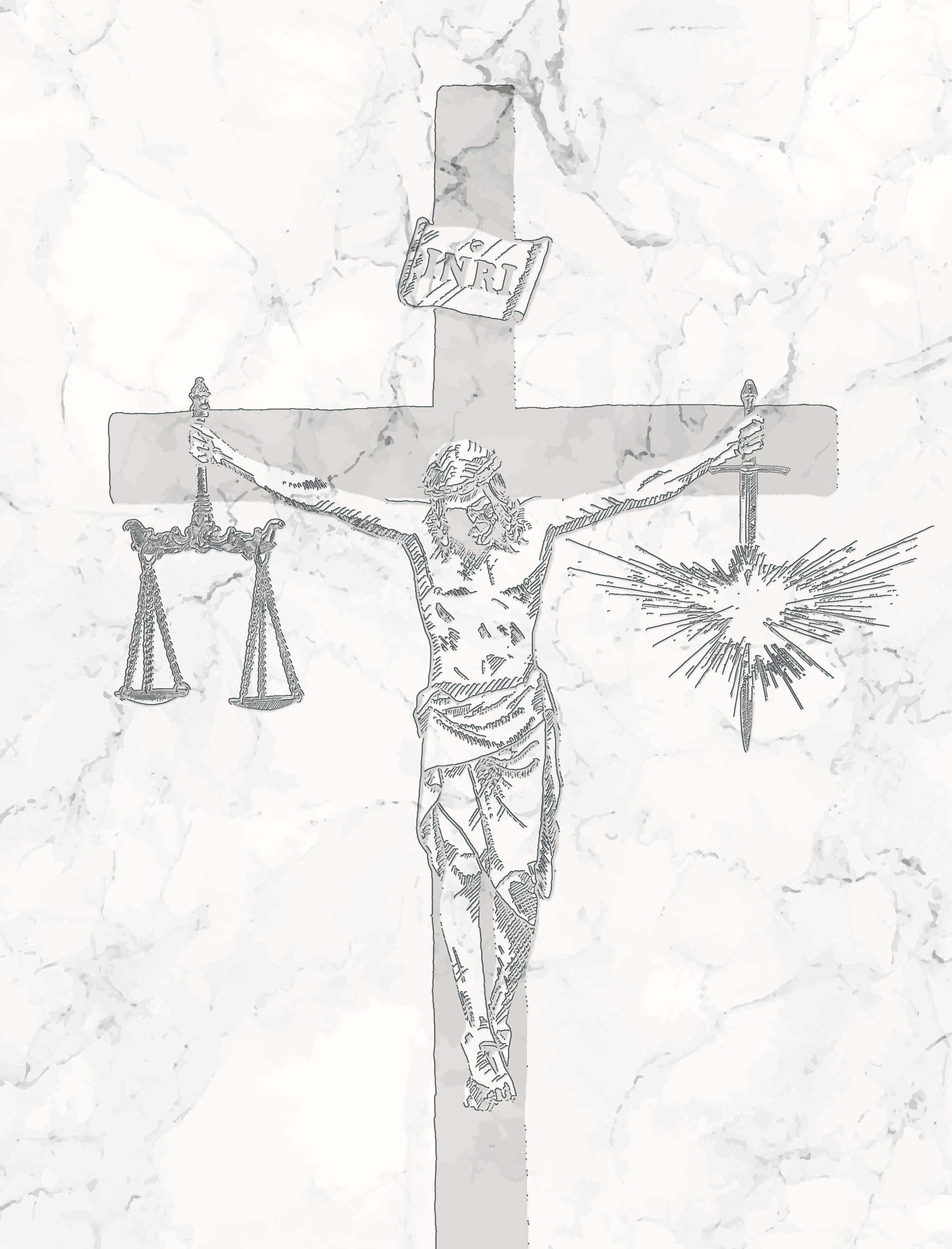
Art: Sam Coates
Bible Society and Bible Poverty
The Bible Society New Zealand continues to focus on the important mission to address Bible poverty, improve Bible literacy and increase Bible engagement. Sonia Munro shares with us the challenges facing this parachurch organisation.

From humble beginnings 177 years ago, influential people like Reverends Samuel Marsden and Walter Lawry were instrumental in promoting the mission of the Bible Society in Aotearoa New Zealand.
After the Auckland Auxiliary Branch of the British and Foreign Bible Society was formed in 1846, it wasn’t long before other regions wanted their own Bible Society. A Wellington Auxiliary of the British and Foreign
Bible Society was formed two years later, followed by Nelson (1854) and Canterbury (1863). The Otago Bible Society, formed in 1864, was more strongly affiliated with the Scottish Bible Society. On 9 May 1946, the United Bible Societies Fellowship was established, and the New Zealand Auxiliary of the British and Foreign Bible Society joined in 1947.
Volunteer army
In small towns up and down the country, Bible Society volunteers were known to go door to door with their little red books, collecting funds and selling Christmas cards to support the Bible mission work. In some places, Bible Society volunteers formed ‘Action Groups’. These groups were made up of supporters from different denominations who would gather together to plan and deliver fundraising events three or four times a year. Funds raised from these events went to support local and overseas appeals so Bibles could be translated, printed and distributed to people groups around the world.
There was a strong Christian presence in these communities and a real sense of camaraderie as people worked together and were unified in their belief that the Bible was central and core to the Christian faith. Bible Society volunteers actively demonstrated their faith through their ‘good works’, by holding fundraisers like Bible quizzes, bake sales, soup and savoury luncheons, sponsored walks, car rallies, art auctions, musical concerts, as well as Run or Ride for Bible events. They believed in the mission that all people everywhere,should be able
16 October 2023
to access a Bible in their heart language, at an affordable price and in a format that encouraged interaction with the Bible.
The changing landscape
We have seen significant changes in our communities over the past few decades which have impacted on volunteering. Immigration policies have led to a more culturally diverse population, with different worldviews, political ideologies and spiritual beliefs. Church attendance, Bible ownership and volunteering has declined, and our nation has become increasingly secular. Mother Teresa, who devoted her life to serve the poor in India, understood the true human condition when she said, ‘God does not create poverty; we do, because we do not share’. By sharing our time and resources, we can help to alleviate Bible poverty in countries where Christianity is a minority religion.
Factors such as an aging population, less free time and the high cost of living have reduced the pool of volunteers available to serve and support fundraising initiatives. In the ‘State of Volunteering Report 2020’, Joanna Go’s research revealed that 36.6 percent of New Zealand’s registered charities found retaining volunteers to be their biggest challenge. Bible Society New Zealand has seen its volunteer base and active fundraising decline over the last decade. The questions are:
How do we connect and motivate millennials to value the Bible Society like their grandparents who had a strong sense of commitment towards the Bible mission? How do we share our mission effectively with new church denominations, house churches and churches where English isn’t spoken? It is imperative that the Bible remains at the heart of Christian life and service, so Bible Society New Zealand volunteers are united in their desire to see Bible poverty erased once and for all!
Progress with translations
Out of the 7389 global languages, there are still 3776 languages that have no passages or portions of Scripture in their own language. In response to this need, the United Bible Societies Fellowship has created a strategy called ‘The Bible Translation Roadmap’ to co-ordinate the work of translation experts and local translators to focus on 1200 of the remaining translations. Next year Bible Society New Zealand will be celebrating the completion of the Old Testament in the Tokelauan language—a project that has taken 27 years.
people and their ability to interact with the Bible. Regular revision of existing translations, publishing new formats and creating innovative digital content ensures that God’s Word is presented attractively and in a manner that fosters engagement with its readers. Sometimes, this looks like tailored engagement experiences or resources, which help connect the unchanging truths of the Bible with the specific context of a community. Sign language Bibles are making a real difference for people with hearing difficulties; audio Bibles help teach the illiterate in remote places about the Bible story, and braille Bibles help the visually impaired to read, understand and interact with the Bible.
Promoting the Bible
There are many ways people can volunteer for Bible Society New Zealand. If you love to pray, consider praying for the Bible Society and joining their ‘Pray with Us’ prayer team. Another way you can volunteer is to become a church representative where you can advocate about the work of the Bible Society by sharing prayer needs at a prayer meeting; or creating a board to inform people about various appeals; or ordering Bible Society resources for your church. You can volunteer your time and talents by supporting events, organising fundraising actions or speaking to groups about the Bible mission.
As an organisation with a distinguished history in New Zealand, the Bible Society recognises the importance of finding innovative and fresh ways to connect with the culture. They want to remove barriers between
To find our more, visit bibleamonth.nz . To volunteer with Bible Society New Zealand or become a church representative, contact Sonia Munro, Bible Society New Zealand’s Missions Partner— Volunteers & Community Service biblesociety.org.nz
They believed in the mission that all people everywhere should be able to access a Bible in their heart language...
Sign language Bibles are making a real difference for people with hearing difficulties…
saltmagazine.org.nz 17
The Power of the Cross
My name is Ken Baker, I am a kaumātua, a born-again believer and follower of our Lord God and Saviour, Jesus Christ. I am proud of my Māori heritage: Ngapuhi Iwi on my father Grayson’s side, and Raukawa Tainui on my mother Parekura Rawson’s side. This is my story of God’s amazing transforming power and testimony of how I came to Jesus.
I grew up on a marae in Putāruru in my early years. I never met my dear mother Parekura Rawson, as sadly she died in early 1947 of tuberculosis. She was from Whangamatā, and was considered a lovely young woman and mother. I was her only child, born at the end of 1946, so I was only a few months old when she passed at the young age of 19 years. It was a very sad time for me growing up in those early years— it took me 73 years to get one photo of my mum which I treasure to this very day.
Pain-filled years
After Mum died, her mother, my grandmother Kuia Wahi, looked after me. She spoke only te reo Māori. Sadly, she died when I was about seven years old, and I was sent to live with my father and his whānau (family). There I experienced much abuse. It was a hostile environment, where I endured much pain, hurt, alcoholism, fighting, anger, bitterness, hatred and abuse. I was lonely, unloved, unwanted and motherless. Rejected, I ran away from home many times.
A relative from my mother’s side saw the abuse and told my father that she was taking me north to Whangārei, no questions asked! This was a good move and part of God’s plan for me.
Introduction to Christianity
In Whangārei, my aunty was a cleaner for a family by the name of McGiven, and I got to know the family over those years. When my aunty told the McGiven family that she was moving back down south, they asked if they could keep me—like a son. This was similar to a fostering situation, but back then no paperwork changed hands to make it legally binding.
Mrs McGiven was a Christian, and I was able to see Christianity in action in someone’s life.
I settled down and made a life for myself. I attended Whangārei Intermediate, where I did very well. I was then sent to St Stephen’s College in Auckland for three years. I then left school and started an apprenticeship as a panel beater.
Goodness and mercy
When I was 26, I met my beautiful wife Anne (née Perrett) from Australia, we married and 21 months later we had our first-born son Shaun (now Captain Shaun Baker). We stayed in Whangārei for a few more years, then we moved to North Shore, Auckland, where we had our second child Kurt. We lived in Auckland for another three years, then we moved to Australia for almost 20 years.
In Australia, life took a turn for the worse. I took my undealt hurt and pain with me and I became bitter with anger and hatred. I hated God and God’s people. I became an aggressive alcoholic. I would come home drunk and put my family through so much hurt and pain. Apparently our two sons were so very scared, and they would ask their mother why their dad was always angry and smashing things.
During these years my wife and our boys came to Christ, which angered me more. Anne threatened to leave.
18 October 2023
The church told her not to give up on me, and that they were praying fervently for me.
One day I came home from work and all my clothes were thrown out the front door, she’d had enough. I was in shock. She gave me a choice: us or the bottle. People advised Anne to get rid of me, that I was useless, hopeless and good for nothing. But the Dutch Reformed Church she and the boys attended were very good to them. Pastor Cor Vanderhorn visited them, giving them spiritual support. The church told her not to give up on me, and that they were praying fervently for me. Six years they prayed for me before they saw any results.
Anne told me to leave and sort myself out. Well, that short time away from my family was hell for me. I was a lost and lonely man with, I thought, no way back. I considered suicide, but something amazing stopped me in my tracks; looking back I now know it was Jesus Christ, but I didn’t know it at that time.
God’s amazing grace
My first week back, Anne asked me to go to the Assemblies of God church with her in Mt Evelyn, Melbourne; I said no. She asked me again the next week and, to stop her persistence, I decided to go. I went to church but came back with an attitude.

Anne sat me down and said, ‘Ken, God loves you, but he hates what you are doing. Jesus can truly help you if you let him, he will care for you and set you free from what you are doing to us. If you do not repent and ask for forgiveness, you are destined for hell.’ Well, those words drove deep into my heart and my whole being, it struck like a knife through butter. I became restless, scared stiff of what was going to happen to me. I became fearful of hell and Satan. All that week I couldn’t sleep.
The following weekend I got saved! My dear wife asked me, ‘Do you want to go to church?’ This time, without any hesitation, I said yes because I needed to find out if there really was a God.
The pastor, Jeff Bradshaw (a beautiful man of God) announced that if anyone needed prayer for whatever they are struggling with in life, to come up. People started to go forward for prayer, and that’s when
I started shaking like a leaf. I grabbed the side of my chair with both hands and held on for dear life. I said in my heart, ‘I am not going anywhere, not for God and not for God’s people’. Finally, the people sat down, and the pressure released. Then more people went up for prayer. Suddenly all hell broke loose, I started to shake again and I felt so fearful, like my world was crashing around me. I grabbed hold of my chair a second time and said in my heart, ‘No God!’ I was not going anywhere, not for God and not for God’s people.
Again, the people sat down, and Pastor Jeff was just about to read the benediction and close the service when suddenly this mighty voice called out in my head: ‘Come my son, come as you are. I love you and I will set you free’.
I stood up and went forward, tears were flowing— not just mine but Pastor Jeff’s as well. We cried, and hugged the entire congregation, while I’m sure all of heaven looked on in wonder and excitement.
I got saved because of the wonderful power of the cross and because of the wonderful power of prayer.
Above: Ken and Anne Baker.
saltmagazine.org.nz 19
‘Come my son, come as you are. I love you and I will set you free.’
Season of Creation
New Zealand has often been referred to as clean and green, however, there is much within our environment that no longer reflects this catch cry. As we acknowledge the ecumenical prayer and action initiative Season of Creation 2023, SALT highlights the ecological work being carried out across The Salvation Army.
he care of creation is vitally important, as our wellbeing is interwoven with the wellbeing of the earth. We are part of all that God has made, and he entrusted the care of the earth and everything in it to us as stewards and guardians.
This year’s theme for the Season of Creation is ‘Let Justice and Peace Flow’, with the symbol of a mighty river based on Amos 5:24—‘But let justice roll on like a river, righteousness like a never-failing stream!’
We are called to join this river of justice and peace, to take up climate and ecological justice and to speak out with and for communities most impacted by climate injustice and the loss of biodiversity.
Helping our Salves
Captain Mike Bryan is the Chair of the NZFTS Salvation Army’s Environmental Sustainability Working Group, also known as Salves. Salves consists of five passionate members who raise awareness of the importance of creation care and provide resources for Salvationists to live more environmentally sustainable lives.
Mike shares that the rate at which biodiversity is being lost increases daily, and the hope of keeping average temperature increases to 1.5°C is fading. The world we have known, enjoyed and celebrated is changing rapidly.
The Salvation Army International Social Justice Commission recognises environmental degradation as one of the most pressing issues facing the world today, affecting us all. Its effects fall disproportionately on
the most vulnerable, particularly in terms of health, livelihood, shelter and the opportunity to make choices.
The Salves group share examples of these effects:
• polluted waterways causing fish to die affect people who rely on natural resources, also leading to unsafe drinking water and limited food sources
• land for housing that is prone to flooding affects people unable to relocate due to expense, and who don’t have insurance to cover losses
• fishing communities and farmers of low-lying Pacific countries are seeing their islands inundated by sea level rises, which cause gardens to be made infertile because of saltwater, forcing them to move to larger islands away from the coast where they lose their livelihoods and culture.
Degrading environments
Mike suggests the environments in which we live affect our wellness. When we live in degraded natural environments, we are denied a sense of the wonder of God, and it can be a struggle to see the connection between God and creation. Mental health distress is also not being helped by daily news reports about severe weather events, violence and war. This impacts young people in the decisions they make; some now choose not to have children because of the uncertainty caused by climate change and ongoing sustainability.
‘I want people to know they are not alone in this. God cares about this, and God is with us in this. God has
WORDS Captain Rachel Montgomery
20 October 2023
asked us to partner with him. Knowing that there’s a community of Christians joining together to care for creation helps us to know we’re not doing this alone.
Others care about this too,’ says Mike.
God includes within the balance of nature a remarkable capacity for recuperation and regeneration. This can be seen in seasonal rebirth, vegetation reproduction, the water cycle, soil regeneration and species resilience. The earth functions organically, steadily working to heal and renew what gets disturbed. Our intricately ordered environment is designed to operate in careful balance. Unfortunately, many industrial systems function consumptively, not building healing or renewal into their practice. There comes a tipping point for the fine interconnections of creation, when the land is desolate, a species disappears and habitats are destroyed. Environmental concern is the direct result of human initiative and progress.
Environmental awareness, care and concern have seen people increasingly challenged by rainforest destruction, the ozone hole, climate change and the possible loss of spectacular species.

Philosopher, author and pastor Francis Schaeffer writes in Pollution and the Death of Man: ‘If we treat nature as having no intrinsic value, our own value is diminished’.
Sustainability and justice
Fighting for justice often involves an aspect of advocating for those who cannot fight for themselves. Creation cannot speak for itself. It is entirely dependent on humanity, who God entrusted with its care. What might it look like for us, as individuals and in unity, to fight for justice for creation?
Our actions during the Season of Creation are important. Celebrating creation, taking part in clean-ups, planting trees and reducing carbon footprints are some of the immediate actions we can take. As the people of God, we must work together on behalf of all creation, as part of that mighty river of peace and justice.
‘Don’t isolate [yourself] and worry about climate change,’ says Mike. ‘It’s such a big topic and it’s easy to feel overwhelmed. I’d encourage people to join in with others. Do something as a corps or centre. Join in with other community groups and local iwi. There are many projects happening which are helping to care for creation.’
saltmagazine.org.nz 21
The Season of Creation is a vital and necessary reminder that God’s saving, healing, justice-seeking love extends to every part of creation.
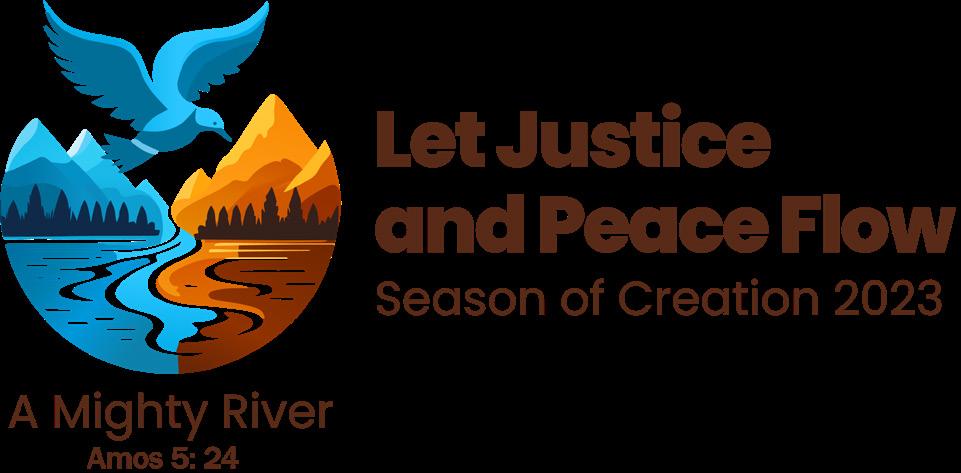
Eco Church
A Rocha Aotearoa New Zealand is part of the A Rocha family of Christian environmental conservation organisations currently active in over 20 countries around the world. They focus on environmental science and research, practical nature conservation, environmental education, creation care and advocacy through a variety of programmes. A Rocha is also involved in resourcing, empowering and building relationships among all those wanting to integrate creation care and sustainability into the life of the church in Aotearoa New Zealand through their Eco Church NZ project.
Joining this project means churches across New Zealand are actively caring for God’s earth as an integral part of their mission. An A Rocha statement says:

‘We support church communities, Eco Church teams and Eco Church champions and help them get started and get organised. Being a part of the Eco Church NZ whānau (family) means that we are not journeying
on our own. We are part of a bigger mission spanning various parishes, church groups and denominations across Aotearoa New Zealand. We support each other through the celebration of knowledge and stories which inspires others to action. Collectively our actions lead to a measurable reduction in waste, carbon, pollution, energy use and much more, and leads to more sustainable ways of living that restore and enhance our natural environment.’
Captain Simon Montgomery, a member of Salves and corps officer at Whanganui Salvation Army, leads a
22 October 2023
Top: Captain Simon Montgomery, Olivia Montgomery and Dianne Kerr, members of the Whanganui Salvation Army Eco Church group. Above: The Season of Creation 2023 campaign branding.
group of people who are passionate about caring for God’s creation and helping to sustain the environment around them. As a corps (church) they’ve decided to join the A Rocha Eco Church NZ project.
‘I’ve always felt a deep connection to nature,’ says Simon, ‘seeing God actively at work within his creation. My passion for environmental sustainability and creation care has grown over the years as I’ve become more concerned with the impact of humanity upon the creation order. Becoming part of Salves has been encouraging for me to partner with like-minded people who share a desire to practise more sustainable ways of living.’
Simon says that there were several people in the Whanganui Corps who also shared this desire, and so they went on the journey of exploring the Eco Church project. Once they joined the project, A Rocha resourced them with different workbooks to help educate and make action plans for the corps to be more sustainable now and for the future. Their Eco Church working group consists of five people, who meet monthly to discuss the workbooks and suggest ideas for corps involvement.
‘We’ve already improved our recycling onsite,’ says Simon. ‘We have green bins clearly labelled in both kitchens, and since we have educated people about what is recyclable, there has been a noticeable increase in recycled products.’
A group from the corps visited the Whanganui Recycling and Resource Recovery Centre for a lesson on recycling and a tour of the facilities. The feedback was incredibly positive, and the group all learnt something new about recycling, which was encouraging. ‘We’ve decided to not use single-use cups and plates for any of our gatherings, instead we choose to wash the dishes’, says Simon.
In the foyer of the corps, there’s now a space where they share excess produce among their corps family, helping to reduce waste and nurture a spirit of generosity. ‘We’ve been exploring ways to reduce our carbon footprint by ride-sharing and using vehicles less. The corps van is used to pick up a group of people on Sundays,’ says Simon.
It is their intention to become involved in local restoration projects, such as tree planting and cleanup efforts at the beaches, river and parks.
‘Joining the Eco Church movement doesn’t mean you’ve got this all together,’ says Simon. It’s an intention to become more environmentally sustainable in everything we do as a church and a commitment to go on the journey of creation care with other churches, environmental groups and likeminded people.
Ways to Respond
1. Pray—God wants to work with us on this, and we can also work alongside others.
2. Join other Salvation Army corps in becoming an Eco Church—this will give a framework for action and help you access support from A Rocha Eco Church.
3. Cut your carbon emissions—walk to work, bike to church, catch the bus, convert to a hybrid, fly less.
4. Do a study on creation care—‘Caring for the Environment’ by Colonel Richard Munn (tinyurl.com/EnvironmentMunn).
5. Support Fair Trade—swap out one nonfairtrade item at a time in your weekly shop. Consider purchasing Salvation Army Hamodava coffee, and ethicallysourced cocoa.
6. Remember your reusable coffee mug.
7. Work with others on local restoration projects.
8. Recycle. Reuse. Repurpose. Reduce.
To learn more about Salves, visit them on Facebook or Instagram: tsa.salves
saltmagazine.org.nz 23
Have you become a bit stuck in your prayer life?
That’s okay. And it’s certainly not unusual. Maybe God is inviting you to try something new. Experimenting with different forms of prayer can enrich your relationship with God—which is the first and main purpose of prayer. As Salvationists we love to roll up our sleeves and serve, so breath prayers, an ancient form of prayer, are a beautiful gift to activists.
Many readers will be familiar with The Jesus Prayer—the most common breath prayer in Christian tradition—but you can write your own or use a psalm or the words of a song or poem. There’s no special ritual or method, just the rhythm of your breath as you inhale and exhale. You can pray a breath prayer in the car, on a long walk, in your prayer chair, or even in bed. You just need a quiet moment and some intentionality.
Using The Jesus Prayer as an example, simply inhale—feel your chest expand as your lungs fill with air— pray: ‘Lord Jesus Christ, son of God’. Exhale slowly and fully, pray: ‘have mercy on me, a sinner’. Repeat this practice for at least ten breaths.
Christian blogger and author Sarah Bessey offers some alternative, original breath prayers (shown on this page) that may be useful or inspirational for writing your own.
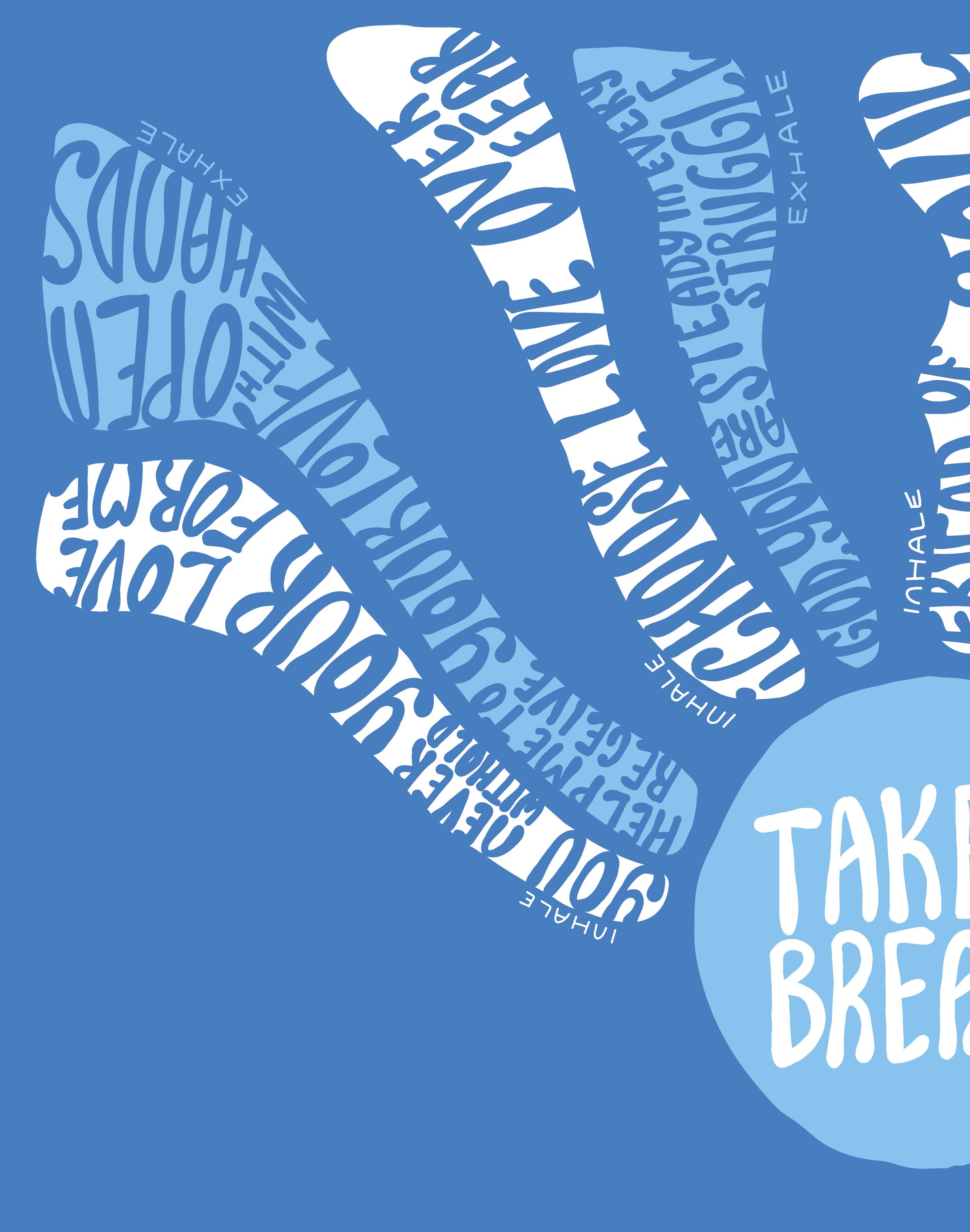
24 October 2023
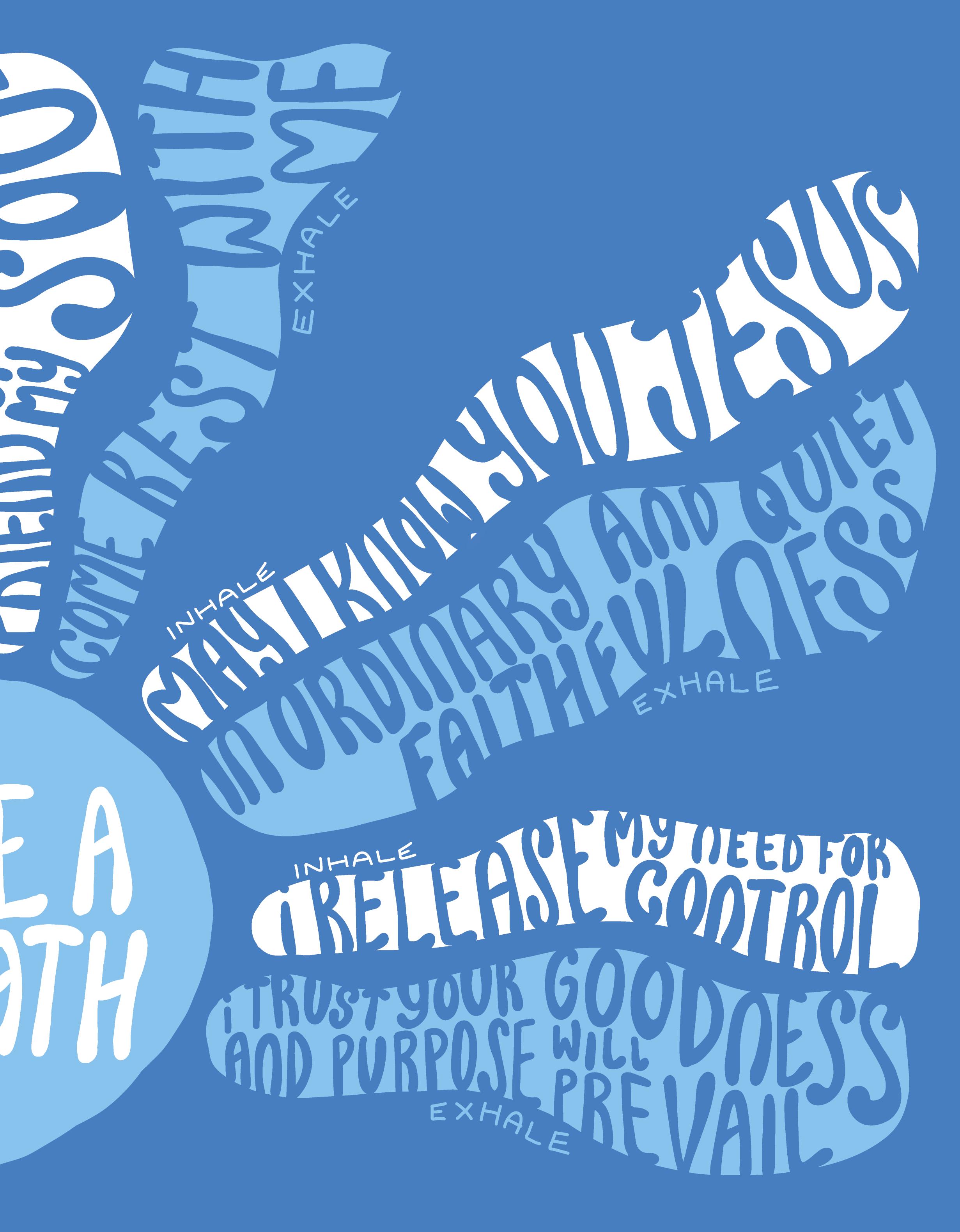
saltmagazine.org.nz 25
Days of Noah, Days of Grace
In times of uncertainty, we can turn to the Bible for comfort and proof of God’s enduring love and care for his people. In part one of a three-part series, Colleen Marshall shares with us the hope that can be ours as we consider the place of safety that is Christ.
Do you remember as a child hearing the story of Noah’s ark? The picture books show the ark with a bearded old man watching the animals stream in two by two. Was it just a far-fetched children’s fantasy or is there a message for us today?

Actually, it was a true event recorded in the Bible, in Genesis 6–9. The ark was God’s provision for a world gone mad. It would be a place of safety, a refuge from a great flood that threatened all existence on the face of the earth.
Up until that time, rain was unknown. Dew came up from the ground to water the earth, but no rain had ever fallen. When Noah’s
building project took the form of an ark and he warned the people of a coming flood, he was mocked and ridiculed. They couldn’t imagine such a thing, and they would not acknowledge Noah’s God who gave instructions to build the boat, which they thought ludicrous.
Undaunted, Noah carried on. He taught God’s righteous standards, but his message was unpopular for a people bent on living for themselves and their own pleasures. No way did they consider themselves accountable to anyone, not Noah and not his God.
The invitation to turn back to God was snubbed, sealing their fate. When the great flood came, Noah and his
family alone were saved, along with the animals. God in his grace had prepared a way of escape but no other person heeded the warnings.
Noah’s preparation
In Noah’s day the world was a hotbed of violence, immorality and godlessness, ‘But Noah found favour
26 October 2023
God warned Noah that his mercy was wearing thin and that a flood would come and destroy the earth.
in the eyes of the LORD’ (Genesis 6:8). God warned Noah that his mercy was wearing thin and that a flood would come and destroy the earth.
By faith, Noah, when warned about things not yet seen, in holy fear built an ark to save his family. By his faith he condemned the world and became heir of the righteousness that is in keeping with faith (Hebrews 11:7). Noah was moved by faith and followed God’s blueprint to build the ark. He built it in full view, nothing was hidden. He pleaded with the people to change their ways, that the ark would be a place of refuge if they believed.
As it neared completion his pleadings intensified. But the people partied away and carried on business as usual, mocking the monstrosity he had built. Salvation was offered—and rejected.
Noah wept at the shamelessness of the people around him, carousing and self-absorbed. His warnings went unheeded. Then he began storing supplies for his family and for the livestock. Imagine it—a year’s worth! They were on the ark for thirteen months. The logistics are mind-boggling. Did anyone question … or just dismiss him as a fanatic?
Once Noah and his family entered the ark, God himself shut the door. Forty days of relentless rain followed. An ominous foreboding gripped people’s minds. Their wailing cries drowned in a haunting silence. Noah had spoken the truth. Remember the film Titanic? How the orchestra played on.
Finally, water engulfed the whole eerie scene as the ship went down.
Days of Christ
Fast forward four millennia to the life and ministry of Jesus of Nazareth. Jesus had a following of disciples whom he taught about the coming of God’s kingdom. He was both loved and hated. Some were furious when he taught with authority, others on the fringes felt welcomed, and warmed to the one who showed grace and compassion to the outcasts and healed the sick.
Jesus, like Noah, also made clear the message that all are accountable to God. That in a future day there will be many signs to signal that life as we know it will radically change and judgement will come. The age of grace has a time limit. Like the prophets of old, Jesus said the choice was up to them. Choose today who you will serve, God or self. Choose life!
Jesus’ disciples wanted to know the timeframe and what God’s agenda looked like. Would there be a sign to warn people? In response, Jesus referred them back to the days of Noah.
‘Just as it was in the days of Noah, so also will it be in the days of the Son of Man. People were eating, drinking, marrying and being given in marriage up to the day Noah entered the ark. Then the flood came and destroyed them all’ (Luke 17:26–27).
God’s rescue plan
We can’t ignore that our world is in upheaval. We can’t deny that weather events are more frequent and intense, often leaving destruction almost beyond belief. We can’t ignore that lawlessness is rampant and that the
value of life is being desecrated. How long will our loving God tolerate such dishonour of his created order? Jesus spoke of a world in chaos as the beginning of birth pangs—see Matthew 24.
But we take courage in the certainties of our faith, God wants everyone to be saved; His heart is for the nations, for all people, young and old, rich and poor, none excluded. ‘For God so loved the world that he gave his one and only Son, that whoever believes in him shall not perish but have eternal life’ (John 3:16). God has made a way of salvation, a way of escape from the tribulation to come. His agenda is not hidden, the Bible declares it in plain view for all to see.
We are living in days of grace. Jesus is the hope of the world. The cross, like Noah’s ark, is God’s provision for us. Jesus spoke plainly, ‘I am the way and the truth and the life. No one comes to the Father except through me’ (John 14:6b). Choose grace, and to follow Jesus.
‘Salvation is found in no one else, for there is no other name under heaven given to mankind by which we must be saved’ (Acts 4:12). What amazing grace that God would save one such as me. May he reveal his grace and mercy toward you and your family that you too will choose the salvation he offers.
God in his grace had prepared a way of escape but no other person heeded the warnings.
saltmagazine.org.nz 27
God has made a way of salvation, a way of escape from the tribulation to come.
National Council of Women: A Celebrated Collaboration
The Salvation Army has a long and storied connection with the National Council of Women New Zealand, with the Army being a founding member of the council at its inception 126 years ago. Recently, a celebration was held at Territorial Headquarters’ Pollard Hall to commemorate this collaboration, and to highlight progress in The Salvation Army’s own gender equity work.

The National Council of Women (NCW) commenced in New Zealand in 1896 as an umbrella organisation of like-minded groups working for gender equality. Kate Sheppard, a prominent woman in the New Zealand suffrage movement, was tasked with forming a branch of the International Council of Women, off the back of women winning the right to vote in Aotearoa New Zealand.
Early battles for equity for the council included familiar topics for the Army: prison reform, equal pay and ‘the effects of the evils of the traffic of alcohol’. It was said of prison reform at those early meetings that there was a ‘need for a system which would restore or create self-respect, that would develop moral fibre, and would let in the sunshine of
hope upon the inmates’—work that The Salvation Army continues to champion to this day through various expressions within the Army, including the Social Policy and Parliamentary Unit (SPPU).
Celebration and commemoration
The celebration of The Salvation Army’s work with the council was attended by many women within the Army who have been involved over the years, including Commissioner Astrid Herring, Colonel Wynne Reddish, and Major Christine Rattray who received a certificate of recognition for her 35 years of representation on the council. A ‘high tea’-style lunch was prepared for the guests, who were able to listen and reminisce about the Army’s work within the council.
Commissioner Julie Campbell welcomed everyone and reflected on the impressive work of The Salvation Army in gender equity, with the support of the council as an umbrella organisation. ‘When I look back at the list of those who have been involved, I’m amazed at what our army of women have done throughout the years, and I want to thank God for every one of you. We want to celebrate the great things God has done in and through so many of you, to set the foundation for us as women and as The Salvation Army, to be a voice in our community and to raise the voices and improve the lives of women in our country.’
Strengthening our own mahi (work)
Julie explained that as the NCW has grown and gone through a recent restructure, the Army has had the opportunity to consider its place within the council as contributors to government submissions. A decision has been made to step back from collaboration with
The celebration of The Salvation Army’s work with the council was attended by many women within the Army who have been involved over the years...
28 October 2023
Above (from left): Major Christine Rattray, Commissioner June Kendrew, Major Joanne Jellyman, Major Wendy Sanson, Colonel Wynne Reddish, Major Janee Sawyer, Captain Emma Howan, Linda Walsh, Commissioner Julie Campbell and Commissioner Astrid Herring.
the council, to further focus on the Army’s own advocacy work through Women’s Ministries and SPPU. Julie will continue to be connected to the council to understand what is going on at the national level, and some women in the Army will remain members of their local branches of the NCW for the time being.
Many
the attendees
There was an emphasis at the lunch of celebration and acknowledgement of the hard work and successful advocacy that The Salvation Army had been able to be a part of in collaboration with the NCW. Many of the attendees shared memories of their time on the council, and Major Janee Sawyer shared a short history of the Army’s time in the NCW.
Advocacy and representation
Janee noted that at the beginning of the NCW’s work, ‘the men of the colony were unhappy about the creation of the council’, and newspapers of the time reported on their presence, including The New Zealand Herald and The Evening Post, who also appeared disgruntled at the new work of a women’s organisation. Kate Sheppard said at the time, ‘It is quite possible that it might be said that as the council is composed of women, it should confine itself to women only’. Sheppard had no sympathy for this view, as they were ‘human beings as well as women, and their humanity must take precedence over their womanhood’.
The Salvation Army has been represented on the council by many significant officers over the years, and Janee made time to honour some of them and their contributions to the council’s work.



She talked about Lt-Colonel Janie Searle, who was the only national president of NCW to also be a Salvation Army officer and who represented New Zealand on the International Council. She was also credited with a high record of service in a number of NCW branches, due to her moving around the country frequently as an officer. Another notable officer was Lt-Colonel Viola Blincoe, who was celebrated at the council as the first woman to be appointed trade secretary of The Salvation Army, and the following was recorded: ‘For a woman to
be promoted to such a position, which was generally considered to be the prerogative of men, is an honour to all women in this country’.
This celebration honoured and recognised the ways in which women in The Salvation Army have been advocating for gender equity across a range of issues within the NCW, with the assurance that this work will continue and strengthen through their own focused advocacy channels.
of
shared memories of their time on the council…
saltmagazine.org.nz 29
Above (top row): Major Christine Rattray, who received a certificate of recognition, and Major Janee Sawyer; Bottom row: The celebration held at Territorial Headquarter’s Pollard Hall.
New Fale Nofo’anga for Kolovai Officers
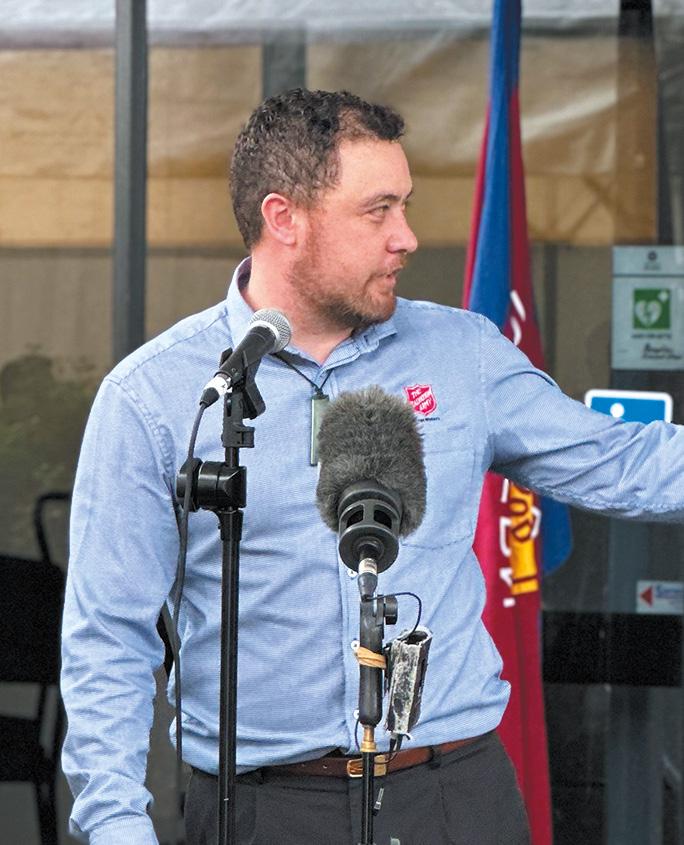
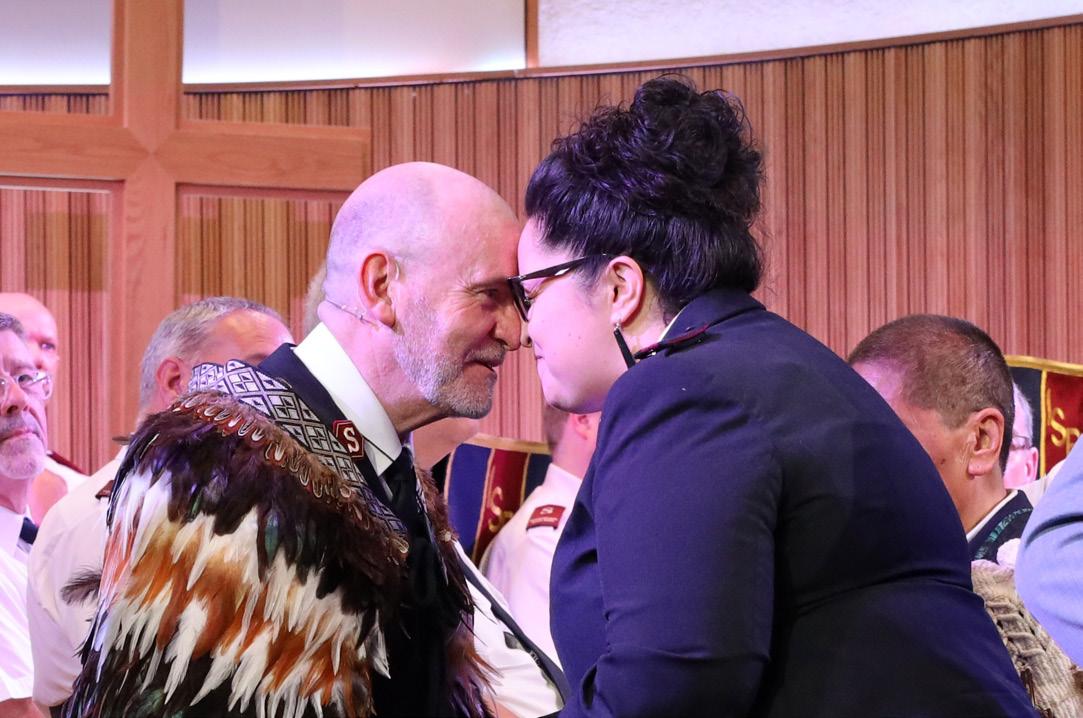
Kolovai Corps in Tonga is eagerly awaiting the arrival of two 40-foot shipping containers. Inside the containers are the materials for a brand new four-bedroom EasyBuild fale (house). A team of 15 volunteers from all over New Zealand will soon follow. The team includes builders, an electrician, a plumber, a range of DIY enthusiasts and labourers. With the goal of putting the house together in just two weeks beginning mid-October, when completed the house will become the Kolovai corps officers fale nofo’anga (quarters). Kolovai Corps has never had an official fale nofo’anga, with various rental properties serving as officers’ accommodation for the past decade. However, Regional Leader for Tonga Captain Kenneth Walker explains that when the eruption of Hunga Tonga Ha‘apai occurred in January 2022, with the ensuing tsunami, everything changed.
For the full story, go to saltmagazine.org.nz
Hui Strengthens Early Childhood Education Community Centres

Salvation Army Early Childhood Education (ECE) leaders came together in Auckland recently to further strengthen the service which reaches around 150 children every day. The one-day hui included the leaders of each of the four Salvation Army ECE centres, along with the related directors/corps officers who oversee services locally and other senior leadership. The Salvation Army operates four ECE centres, which provide quality Christian early childhood care, education and wraparound whānau-care services in the community. The centres are located in Mt Wellington, Waitākere, Newtown and Upper Hutt.
For the full story, go to saltmagazine.org.nz
General’s Welcome
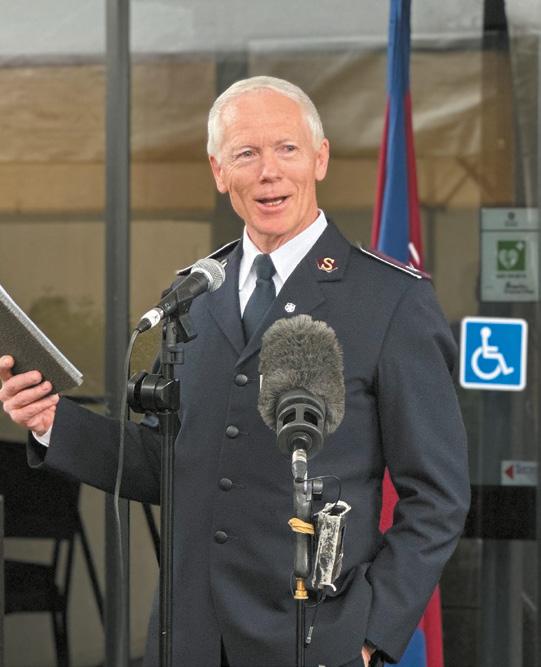
On Sunday 3 September, Salvationists from around the world joined the livestream from Regent Hall in London to welcome the 22nd General of The Salvation Army. Together with the new World President of Women’s Ministries Commissioner Bronwyn Buckingham, General Lyndon Buckingham proclaimed, ‘You can be certain that we will serve with all we’ve got for the glory of God and for the extension of his kingdom.’ The first words the General spoke when he greeted his global audience were in te reo Māori, with representatives from New Zealand— Captain Hana Seddon, Major Campbell Roberts, Aux Captain Nan Patea (Rūnunga Kaumātua) and Hohepa Patea—presenting Lyndon and Bronwyn with traditional chiefly korowai (cloaks).
For the full story, go to saltmagazine.org.nz
30 October 2023
General Lyndon Buckingham shares a hongi with Captain Hana Seddon at Regent Hall in London.
Ōamaru Corps Celebrates 140 years
Ōamaru Corps celebrated its 140th anniversary over the weekend of September 2–3. The corps was founded on 2 September 1883 by Captain George Pollard and Captain Jabez White—two Salvationists historically renowned for their leadership and zeal. Ōamaru was the eighth corps to be established during The Salvation Army’s first year in New Zealand. Special guests for the weekend were Majors Denise and Ken Smith (Nelson Corps) who went to training college from the corps in 1998, and historian Major Kingsley Sampson. The programme for the weekend was carefully curated around the theme of ‘Honour the Past, Celebrate the Present, Imagine the Future’.
For the full story, go to saltmagazine.org.nz
Medical Centre Opening
The Salvation Army celebrated the opening of its first medical centre in New Zealand on Monday 18 September in Royal Oak, Auckland. ‘Hauora Service—Health Care for All’ aims to provide a comprehensive primary care service focused on achieving health equity for all people, particularly those who live with and experience mental health and addiction challenges. The medical centre is open to the public and anyone looking for quality, holistic healthcare at an affordable price. The ceremony was opened with a karakia (prayer) by National Operations Manager Lt-Colonel Jenny Carey, followed by a mihi whakatau by Pipiwharouroa Campbell, pou ahurea (national Māori lead, left) for Salvation Army Addictions, Supportive Accommodation and Reintegration Services (ASARS). A warm welcome was then given by National Director Lt-Colonel Rod Carey (right) to those in attendance. For the full story, go to saltmagazine.org.nz
Invercargill Corps Celebrates 140 Years
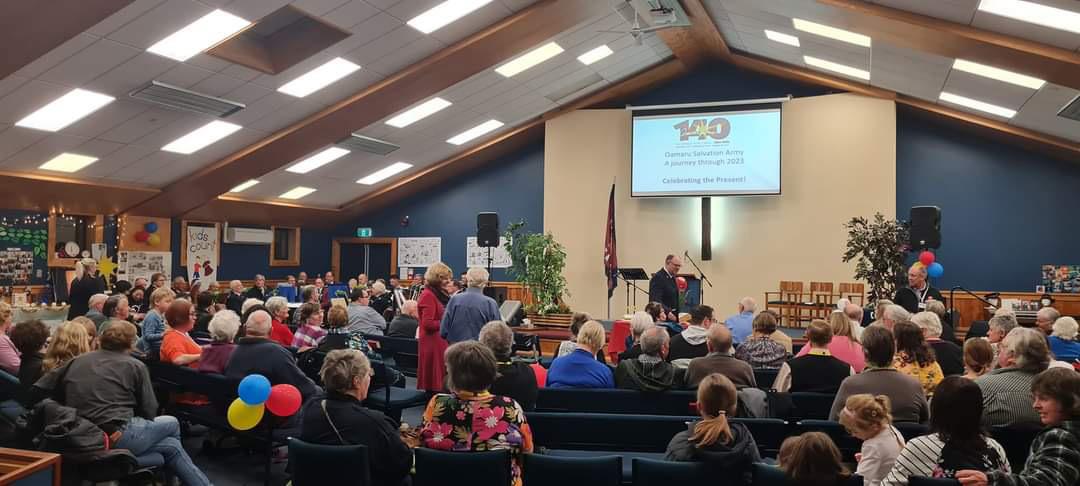
It was a party in the south on September 9 and 10 when Invercargill Corps marked its 140th anniversary. Friends and officers from Invercargill and many parts of the country gave all glory to God as they celebrated 14 decades of the Army serving the city’s spiritual and community ministry needs. The theme ‘Going Forward with God’ reflected the resolve to continue marching steadfastly into the future.
Special guests for the weekend were members of The Salvation Army Territorial Youth Band under Bandmaster Duncan Horton, as well as the band’s executive officers, Captains Shane and Sarah Healey. For them it was a return home, as Invercargill was where they first met.
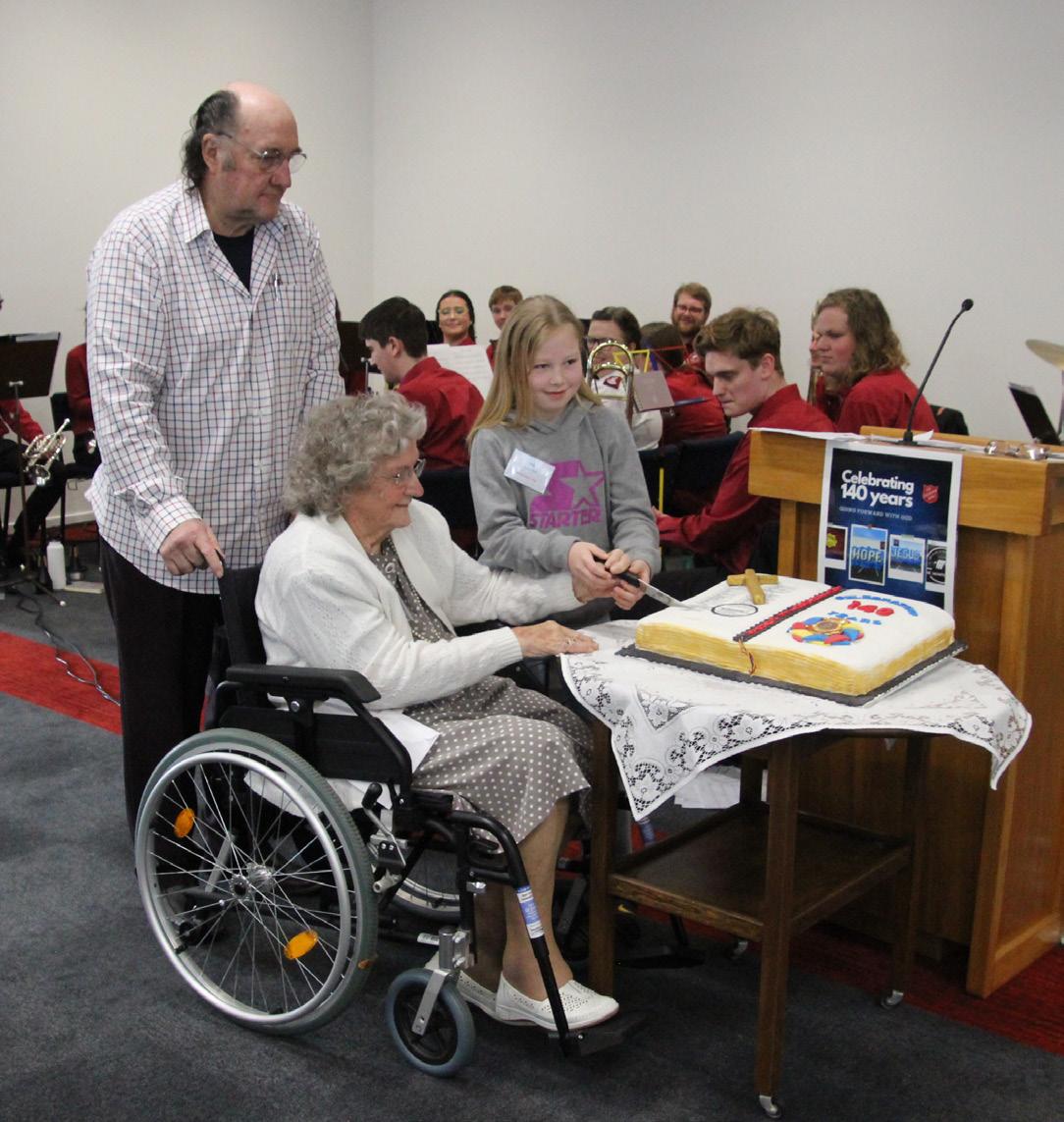
For the full story, go to saltmagazine.org.nz
Looking for more news?
Read the latest news online at saltmagazine.org.nz
saltmagazine.org.nz 31
Dorothy Lemin (assisted by her son Wayne) and Mia Templeton (9) cut the anniversary cake.
Official Engagements
Commissioners Mark (Territorial Commander) and Julie Campbell (Territorial President of Women’s Ministries)
30 Sep–1 Oct: Thought Matters Conference, Booth College of Mission
17 Oct: Fiji Division 15-Year Review (online)
18 Oct: SFOT Fiji Spiritual Day (online)

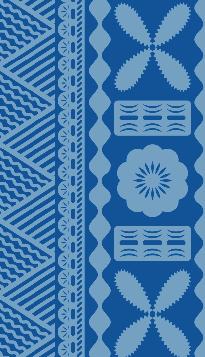


19 Oct: Jeff Farm appreciation dinner for Chittocks
20 Oct: Jeff Farm Annual General Meeting
29 Oct: Praying Together (online)

Colonel Gerry Walker (Chief Secretary)
9–13 Oct: ADAC 25th Celebration, Tonga Region
18 Oct: Spiritual Day, Booth College of Mission
Lt-Colonel Liz Gainsford (Territorial Secretary for Spiritual Life Development)
30 Sep–6 Oct: International Training Principals Conference, Kenya
18 Oct: Spiritual Day, Booth College of Mission
Gazette Summary
To read the full version of Gazette notices, visit saltmagazine.org.nz/gazette
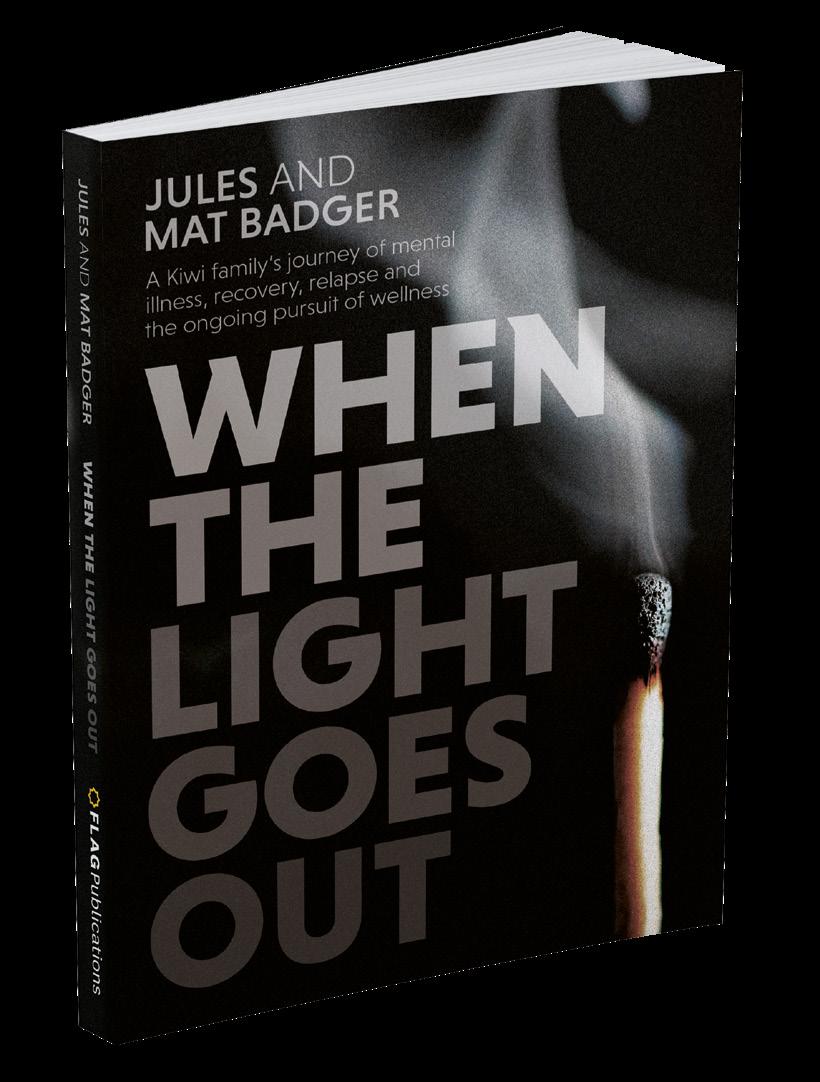
Bereavement: Mele Hafoka Vea, sister of Captain ‘Eliesa Prescott, passed away suddenly on 31 August 2023 at Prince Uelingatoni Ngū Hospital, Vava’u, Tonga. A funeral service for Mele was held on 7 September 2023 at Niuatoputapu, Tonga. Please uphold in prayer Captains ‘Eliesa and Selalina Prescott and their extended family at this time of grief and loss.
Appointment in Retirement: Effective 16 November 2023, Majors Denise and Stephen Crump are appointed as corps officers, Timaru Corps, Southern Division. Please pray for Majors Denise and Stephen as they prepare to take up this appointment in retirement.
50 years of The Salvation Army in Fiji 1973–2023
MARCHING ON: 50 Years Strong Founded on Faith; Inspired by Hope; Serving with Love
For more information and to confirm your attendance, please contact: Major Iliesa Cola or Captain Beth Campkin fiji.dhq@salvationarmy.org.fj
3–5 November 2023
For more information, please contact Major Silone Collins p: 027 478 4452 | e: kilbirnie.corps@salvationarmy.org.nz
Quiz Answers: 1. A sleuth or sloth, 2. Venus, 3. Cheese, 4. Red, 5. Japan.
Kilbirnie
Anniversary
Save the Date
Corps 110th
OUT NOW Purchase the book at tinyurl.com/ BadgersBook
Vodafone Arena, Suva 32 October 2023
MAIN EVENT 15–17 December at
SALVATIONISTS IN HISTORY
An Innovative Army
The Salvation Army has a long history of innovation when spreading the gospel. From its earliest days in England, via the spread of the mission to countries around the globe and right through to today, The Salvation Army has been an early adopter and innovator. This edition of Salvationists in History highlights several of the movement’s early innovations.
Safety matches
In 1891, The Salvation Army’s co-founder William Booth started the mass production of safety matches. At the time, standard matches contributed to ‘phossy jaw’ among poor match makers. Poor people—including women and children—worked long hours to make matches at home to earn extra income. They would dip the matchsticks in a dangerous chemical, sometimes at the same time as eating a meal. The consequence of this was the phosphorous eating away their gums and jaws.
William Booth saw the issue and wanted to stop the widespread suffering. He opened a factory that produced ‘safety matches’, which did not contain phosphorous. The factory was comfortable and well aired and the workers were paid fair wages.
In the face of this model, the match manufacturers of Britain soon had to adopt fairer and safer methods of production.
The white car
In August 1904, aged in his mid-70s, William Booth started his first motor tour, travelling from Land’s End, England, to Aberdeen, Scotland. This was followed by six more motor tours. Even though he was elderly, Booth was very willing to embrace new ideas and change in the service of The Salvation Army mission. He was one of the first people to use motor transport in connection with an evangelistic campaign. The Salvation Army published a book in 1906, titled

The Romance of a Motor Mission with General Booth on his White Car Crusade by W.P. Ryan. At a time when black was the common colour of cars, Booth decided to paint his white, which helped to attract extra attention. The car was open topped, allowing Booth to stand up at any time to preach. At the time, the motorcar was a new and exciting technology. According to the United Kingdom National Archives, there were just 23,000 cars on Britain’s roads by the end of 1904. The London Transport Museum notes that in 1900, almost every vehicle on the streets of London was horse-drawn, with more than 300,000 horses employed in transport.
‘Soldiers of the Cross’
In 1900, The Salvation Army in Australia showed what has been called the world’s first ‘photo drama’ or ‘story film’. ‘Soldiers of the Cross’ is perhaps best described as a multimedia event, which included 16, 90-second motion picture segments, over 200 magiclantern slides, music by an orchestra and choir and rousing oratory by Commandant Booth, the territorial commander for Australia and General Booth’s son.
Put together by the Limelight Department in Melbourne over 12 months from 1899 to 1900, the two and a half hour show premiered on 13 September 1900 at Melbourne Town Hall before a crowd of several thousand people. It was part of an effort to attract 200 cadets for the new federal training garrison.
The show depicted incidents in the lives of outstanding witnesses for Christ, beginning with first-century martyrs. The actors in the film were cadets from the Army’s training garrison, while the filming—which included lions from a nearby circus— took place on the grounds of an Army facility.
The movie was well ahead of the times in realising that a multimedia event would attract crowds to hear the gospel.
saltmagazine.org.nz 33
Think it or Say it?
We all say things to others that we wish we hadn’t said. Before we know it, the words are out of our mouth, sometimes with little thought about their impact. The truth is hurtful words can cause just as much pain as a physical injury. Once something is said, it cannot be unsaid—you cannot put the toothpaste back in the tube!

Teaching our children to think carefully before they speak is an important social skill. A good way to help your children to develop this skill is to talk about social filters. The term ‘social filter’ refers to our ability to assess which of our thoughts we should verbalise and which ones we should keep to ourselves.
Think of a social filter like a coffee filter—a barrier that lets the good stuff through and collects the not so nice dregs. Not all of our thoughts and feelings are appropriate to share with all people. When we use our social filters, we think before we speak to ensure we keep our hurtful thoughts to ourselves and share our positive and affirming thoughts with the people around us.
Here are some strategies to teach children to think before they speak:
· Rehearse different scenarios and situations at home using social filters.
· Role model using language that is positive and affirming.
· Ask, ‘Is that an inside thought or an outside thought?’ or ‘Is that a thinking bubble or a talking bubble?’
· Use positive reinforcement when your child speaks kindly and encourages others.

· Read books that show examples of characters using or not using social filters, for example I Can’t Believe You Said That by Julia Cook.
· Support your children to pause before they speak by counting to ten or reciting the alphabet.
Read: Our Bible verse was part of a letter written by the Apostle Paul to the church in Ephesus. He was saddened by reports that this church was not working together and encouraging one another. Paul wanted the Ephesian church to be united and he knew that they would be stronger if they worked together and spoke kindly to one another.
Think: Think about how wonderful it feels when someone tells you something kind or encourages you. Think about the people in your life. What can you say to them that will encourage and inspire them?
Pray: Thank God for the people in your life who speak kindly to you. Pray that God will remind you to THINK and to speak good and helpful words to your family and friends.
Do: Have fun colouring in the letters on the opposite page. Cut them out and blu-tack them to your wall (or another place you will see them regularly) so you can remember to THINK.
You can download an A4 version of the letters opposite at: saltmagazine.org.nz/resources
Let everything you say be good and helpful, so that your words will be an encouragement to those who hear them.
Ephesians 4:29B (NLT)
34 October 2023
A fantastic way to develop your social filters is to THINK.
Ask the following questions…
Is it True?
Is it Inspiring?
Is it Helpful? Is it Necessary?
Is it Kind? saltmagazine.org.nz 35
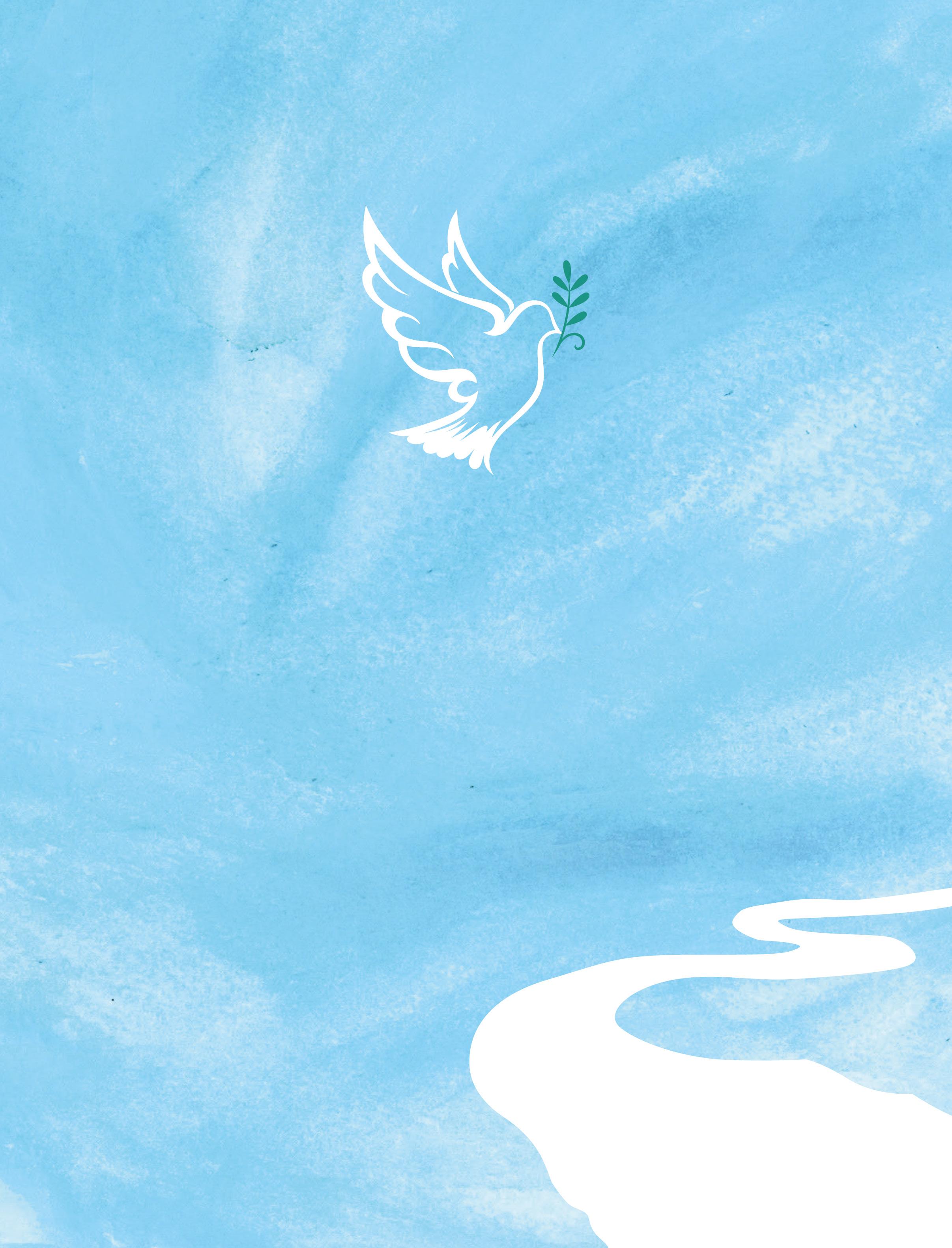
But let justice roll on like a river, righteousness like a never-failing stream!
Amos 5:24






















 Above: The Salvation Army’s Territorial Governance Board with members of the newly formed Rūnanga.
Above: The Salvation Army’s Territorial Governance Board with members of the newly formed Rūnanga.












































